CRUNCH v3.0
Since the post on Creating wordlists with crunch v2.4 made in April last year, crunch has gone through
quite a few changes and improvements and bofh28 has now released v3.0 ! (on 16-05-2011)
To make sure that the information on this blog is staying upto date, its time for a new and improved post.
There will be a lot of duplication from my previous post on crunch, but it should then at least
be a more or less full and complete post.
I have tried to follow the alphabetical order of the options and have done a chapter per option/switch.
Please leave comments should the post be lacking information on anything you feel should be included.
INTRODUCTION
crunch is a tool for creating bruteforce wordlists which can be used to audit password strength.
The size of these wordlists is not to be underestimated, however crunch can make use of patterns to reduce wordlist sizes, can compress output files in various formats and (since v2.6) now includes a message advising the size of the wordlist that will be created, giving you a 3 second window to stop the creation should the size be too large for your intended use.
The full range of options is as follows ;
-b Maximum bytes to write per file, so using this option the wordlist to be created can be split into various
sizes such as KB / MB / GB (must be used in combination with "-o START" switch)
-c Number of lines to write to output file, must be used together with "-o START"
-d Limits the number of consecutive identical characters (crunch v3.2)
-e Specifies when crunch should stop early (crunch v3.1)
-f Path to the charset.lst file to use, standard location is '/pentest/passwords/crunch/charset.lst
to be used in conjunction with the name of the desired charset list, such as 'mixalpha-numeric-space'
-i Inverts the output sequence from left-to-right to right-to-left
(So instead of aaa, aab, aac, aad etc, output would be aaa baa caa daa)
-l When specifying custom patterns with the -t option, the -l switch allows you to identify which of the characters
should be taken as a literal character instead of a place holder ( @,%^ )
-o Allows you to specify the file name / location for the output, e.g. /media/flashdrive/wordlist.txt
-p Prints permutations of the words or characters provided in the command line.
-q Prints permutation of the words or characters found in a specified file
-r Resumes from a previous session, exact same syntax to be used followed by -r
-s Allows you to specify the starting string for your wordlist.
-t Allows you to specify a specific pattern to use. Probably one of the most important functions !
Place holders for fixed character sets are ;
@ -- lower case alpha characters
, -- upper case alhpa characters
% -- numeric characters
^ -- special characters (including space)
-u Supresses the output of wordlist size & linecount prior starting wordlist generation.
-z Adds support to compress the generation output, supports gzip, bzip & lzma
All the below is done on backtrack 5, only tested on the 32bit versions.
crunch is not installed by default on BT5 and as yet (22-05-2011) not yet in the repo's.
(When it does hit the repo's I will amend this post to reflect installing from repo's)
so download from the source at ;
http://sourceforge.net/projects/crunch-wordlist/
Edit; 29-01-2012
and install as follows;
Edit 12-06-2011
crunch is now available in the BT repositories,
so can download and install on backtrack5 simply by doing a ;
The default installation directory / path for crunch in backtrack 5 is
All the below examples are based on being in the crunch directory /pentest/passwords/crunch/
To run crunch from outside of crunch's own directory use ;
/pentest/passwords/crunch/crunch [min length] [max length] [ character set] [options]
example from root directory;
Basic usage is as follows to print to screen
To write to file use the -o switch ;
If no character set is defined, then crunch will default to using the lower case alpha character set;
Also any desired character set can be enterered manually in the command line ;
./crunch 6 6 0123456789ABCDEF
Certain characters will need escaping with a backslash \ ;
Using the -b switch, we can tell crunch to create a wordlist which is split into multiple files
of user-specified sizes.
This must be done in conjunction with -o START.
The size definition can be; kb, mb, gb or kib, mib, gib
kb, mb, and gb are based on the power of 10 (i.e. 1KB = 1000 bytes)
kib, mib, and gib are based on the power of 2 (i.e. 1KB = 1024 bytes).
The output files will be named after the first and last entry in the wordlists.
To create a wordlist split into files of not more than 1mb;
To create a wordlist split in files of no more than 100mb;
To create a wordlist split into files of no more that 10kb;
To create a wordlist split into files of no more than 2gb;
etc.
Using the -c switch you can have crunch create wordlists which do not contain more than the
specified number of lines.
This must be used in conjunction with -o START.
To create files containing no more than 200000 (200 thousand) lines (passphrases);
./crunch 6 6 0123456789 -c 200000 -o START
To create files containing no more that 150000 (150 thousand) lines (passphrases);
The output files will be named after the first and last entry in the wordlists.
STOPPING CRUNCH WORDLIST GENERATION AT A PRE-DETERMINED TIME
Crunch v3.1 is now also released (20-07-2011) and with it comes the new -e switch.
This option allows you to specify when you want the wordlist generation to stop.
So the below example will start creating the 6 character numeric wordlist, but will stop at 333333 ;
./crunch 6 6 -t %%%%%% -e 333333
Crunch also comes with fixed character sets in charset.lst which is included in the installation.
(also found in directory /pentest/passwords/crunch/ )
This saves on the typing (and typoes) when dealing with standard character sets.
To use the fixed characters sets, instead of typing in character sets manually in the command line,
you can use the -f switch to specify which character set we want to use ;
To use only upper case alpha characters;
To use only numeric characters ;
To use hexidecimal characters (with uppercase alpha values) ;
To use lower case, uppercase, numeric & special characters (beware of the size ! Don't try to save..lol..) ;
etc.
etc.
Since v2.7 additional Swedish character support has also been added for our Swedish brethren, nicely contributed by Niclas Kroon.
It should be noted that you can easily create your own custom charset by simply including a line in the same format.
If you for instance know that your target has a certain medical condition known as 133tsp34k, and you have an idea of which letters/numbers are usually used (forum posts etc. etc.) , you could simply include an extra line such as ;
1337 = [4bcd3f9hijk1mn0pqr$7uvwxyz]
Doubt the above is authentic enough, but I'm sure you get the idea.
Then just run in crunch as you would any other charset;
./crunch 4 4 -f charset.lst 1337
See /pentest/passwords/crunch/charset.lst for all possibilities / charsets currently included.
Note that this does not change the content of the created wordlist, it only changes the intial direction in which it is created.
The -i option can also be used when character sets have been specified, either manually or using the pre-defined charsets.
./crunch 4 4 -f charset.lst ualpha -i
or for instance for creating numeric wordlists in an alternative direction ;
If you actually want the wordlist creation to start from the last letter in the alphabet and work backwards, or
work backwards from the last digit in a 10 digit numeric sequence, then you would have to enter the charset manually ;
Crunch can also be used to create permutations for either ;
> characters / words entered in the command line with the -p switch.
> lines in a wordlist with the -q switch
Although there is no min/max character setting, this still needs to be entered for both
the -p and -q switch.
Using the -p switch you can create permutations of characters or of all words entered in the command line.
Creating permutations of letters (fun for anograms) ;
Creating permutations of lists of words;
./crunch 1 1 -p bird cat dog
As the -p switch can read the input on command line as being letters or words, it MUST be the last option used;
If for instance trying to suppress the size output message using the -u switch and placing the -u switch last,
crunch will see 2 words (abcd + -u) and so will only print out the 2 permutation possibilities as well as actually recognizing the -u switch ;
./crunch 1 1 -p abcd -u
So to ensure the output is as expected, the -p switch MUST always be the last option, and the correct syntax
with the above example would be ;
Using the -q switch, you can create all possible permutations of words in a text file ;
(as always, beware of the possible size ! This best done on a 'focussed' wordlist)
As an example, create a small text file with 3 lines and then run crunch over it with the -q option;
RESUMING WORDLIST CREATION AFTER CANCELLATION
crunch allows a wordlist creation to be stopped and restarted, to do this we use the -r (resume) switch.
For this to work we must type the exact same line followed with the -r switch ;
If the wordlist was started from a specific position (see below chapter) then
when resuming the -s switch as well as input must be removed ;
When using this method, the notification on %% complete will not be accurate.
Also, when resuming, crunch will advise that it is generating xx amount of data and xx number of lines.
This information will not be correct as the calculation process thinks it is resuming from a creation of an entire wordlist, whereas it is of course resuming from a wordlist with a certain startblock.
The below picture probably explains it better..
./crunch 8 8 0123456789 -o test.txt -r
If we want to start crunch from a specific position in the wordlist we want to create, we can use the -s
switch to use a specific startblock as starting position for the wordlist.
For instance, if you started creating a wordlist, but had to cancel and resume on a different disk or HDD space ran out.
The temporary file that crunch uses for the wordlist creation is "START" located in the crunch directory
You can check this temporary file for the last couple of entries to allow you to move/rename the temp file START
and restart the wordlist creation without losing the work already done.
example ;
> check the last couple of entries in the START temporary file ;
NOTE! crunch will overwrite START when it starts a new wordlist creation process, so be sure to rename START into whatever you want to ensure you don't lose the work already done !
Of course using the starting block can be used for whatever reason, for instance if you are sure that you don't need any list with numbers starting before 59999999 ;
This is where crunch really shines, and in my humble opinion, the most powerful capability that crunch has to offer.
With a minimum amount of information on known or expected patterns and/or possible characters in the passphrase, custom patterns can be created allowing to specify what to place where in the created passhprases.
In doing so the size of the wordlist can be reduced significantly and the wordlist can be tailored to the target in a much more efficient way, which is always to be endeavoured !
To fix a pattern, we use the -t switch in crunch.
There are fixed symbols used for certain character sets ;
@ --> Lower case alpha values (or @ will read and print from a specified character set, see further down in post)
, --> Upper case alpha values
% --> Numeric values
^ --> Special characters including 'space'
So if we want to create a 6 character, lower alpha wordlist and with a pre-fix of 'dog';
or if we want 'dog' to be appended ;
or have 'dog' bang in the middle ;
Or 'dog' followed by an upper case alpha, number and symbol;
Miscellaneous patterns
We can also combine the various fixed character sets, for instance, if we want to create an 8 character
wordlist with alpha, numeric and special characters in fixed positions;
Using the fixed character sets you can quickly and easily make 'quick' wordlists for a single character set..
Creating a wordlist with only lower case;
./crunch 4 4 -t @@@@
only numeric;
./crunch 4 4 -t %%%%
or only uppercase;
./crunch 4 4 -t ,,,,
only special characters;
And of course if certain positions and characters are known, it can all be mixed up ;
./crunch 9 9 -t %%DOG^^@@
We can also even go a step further and specify which range of characters should be used for each character type.
In the below example ;
lower alpha values to only be ; abcdef
upper alpha values to only be ; ABCDEF
numeric values to only be ; 12345
special characters to only be ; @#$%
We can then specify same by entering these values manually in the command line ;
If there is no specific character range to be used for the character set, then that position should be
completed with a '+' placeholder sign which signifies the usage of the complete standard character set for that set positon. (lower alpha -- upper alpha -- numeric -- special characters)
The below example is using 'abcdef' as lower alpha charset, the full upper case charset, '12345'as numeric charset and the full special character charset.
Although in the above examples @ is used as fixed character set for lower case values, we can also use it to specify a manually chosen single set of all types of characters ;
Remember that certain characters on some occasion require escaping, if in doubt, better to just do it.
If you want to include a space in the charset, then enclose the charset in quotes ;
(space at end of charset below)
Creating telephone lists
You can also use the -t switch to easily make lists of telephone numbers, so if for instance the telephone number
is usually noted as for instance; 0131-321654, then you could easily create a wordlist of telephone numbers following that same example ;
Or if the layout is different, for instance including a space such as "(01201) 111111" this is achieved by putting quotes on the -t pattern as follows (this to ensure that the space is included);
Endless variations are possible.
The possiblities crunch offers to create patterns with such detail give you many options to really fine-tune what you want placed where in your passphrase wordlist and thus reduce the size of your final wordlist.
This is the case for for instance an exclamation mark ! ;
In order to make it work correctly you must 'escape' the exclamation mark ;
As some special characters are used to define character sets, this can cause some limitations when trying to fix positions of certain special characters. Such as wanting to use @ as a fixed character ;
./crunch 4 4 -t 012@
or
./crunch 4 4 -t 012\@
This will not fix the character '@' but use it to provide lower case alpha values.
To remedy this to some extent, since crunch v3.0, the new -l switch can be used to fix the literal character instead of having it refer to a place holder for a specific character set.
This would now be accomplished by doing ;
Other possibilities;
Also, more than 1 placeholder character can be fixed as a literal character;
Of course this in itself also has limitations as you are not able to to check for all possible lower case alpha
values or passthrough a user defined charset with a fixed setting of the @ character.
The below 2 examples will obviously only return 1 result as all the instances of the @ character will be fixed
as a literal character.
Of course there are workarounds for some part; if for instance you wanted a password list to start with "p@ss"
followed by 4 characters of all possible lower case values, you could create a list of 4 characters;
And then use 'sed' or 'awk' to place the word 'p@ss' in front of each line ;
Using sed ;
So with a bit of imagination and a couple of oneliners with sed or awk, you should still
be able to create more or less what you want.
edit 25-05-2011
bofh28 has informed me of another workaround which can be used.
You can override the standard characters per placeholder setting by entering a different type of
charset in a different position and then using the placeholder character for that position.
Normally the 3rd position is for numeric values, however if you specify lower case values, it will use these
characters, however you then do need to use the place holder for that position, in this example %.
Confused ? You won't be after this episode of .. ;)
./crunch 8 8 + + abcdefghijklmnopqrstuvwxyz + -t p@ss%%%% -l @
Crunch can be used to pipe passwords through to programs such as aircrack / pyrit / cowpatty etc.
Considering that crunch is now advising the estimated size of wordlists to be created following the command given as well as the wordcount, to have a seamless integration with piping, it is recommended to use the -u option to supress that information on size, wordcount etc.;
Without using the -u command, it is possible that unexpected errors occur with some programs.
Using the -u option will result in the creating of the wordlist directly instead of giving the 3 second delay during which the estimated wordlist size and wordcount is shown ;
In examples only testing for 8 character numeric passwords ;
aircrack
./crunch 8 8 -t %%%%%%%% -u | aircrack-ng -e SSID -w - /pathto/capfile.cap
cowpatty
./crunch 8 8 -t %%%%%%%% -u | cowpatty -f - -r /pathto/capfile.cap -s SSID
pyrit
./crunch 8 8 -t %%%%%%%% -u | pyrit -i - -r /pathto/capfile.cap -e ESSID attack_passthrough
Output files can be compressed with crunch using the -z switch.
Supported formats are;
> gzip
> bzip
> lzma
Crunch will first create the wordlist and will then compress the wordlist.
Upon the finalisation of the wordlist creation, you will see the 100% being reached
and the 100% denomination will continue to be printed until the compression is complete.
So if you see a continuous 'stream' of 100%, don't worry, the program is not hanging,
the output file is simply being compressed.
It had me guessing when I was testing a compression of a couple of gigabytes.. but I assure you it is the case.
The best level of compression and thus the slowest is obtained with lzma.
The quickest compression, with the lowest level of compression, is obtained with gzip.
gunzip test.txt.gz
= = = = = = = = = = = = = = = = = = = = = = = = = = = = = = = = = = = = = = = = = = = = = = = = = = =
If you managed to come this far, well done, you are a patient / dedicated person :)
Hope it wasn't too boring to go through ;)
bofh28 has once again done a fantastic job in reaching the 3.0 milestone and
a little birdy tells me there is yet more to come :D
If and when revisions come out, I will try to keep this post updated to reflect the changes / additions.
Keep up the great work bofh28 !!
To actually manipulate an already created/existing wordlistm check out ;
http://www.adaywithtape.blogspot.com/2011/07/wordlist-manipulation-revisited.html
Warning... this is a looong post, grab a beverage.. ;) Also heavy on images..
PRE-INTRO Since the post on Creating wordlists with crunch v2.4 made in April last year, crunch has gone through
quite a few changes and improvements and bofh28 has now released v3.0 ! (on 16-05-2011)
To make sure that the information on this blog is staying upto date, its time for a new and improved post.
There will be a lot of duplication from my previous post on crunch, but it should then at least
be a more or less full and complete post.
I have tried to follow the alphabetical order of the options and have done a chapter per option/switch.
Please leave comments should the post be lacking information on anything you feel should be included.
INTRODUCTION
crunch is a tool for creating bruteforce wordlists which can be used to audit password strength.
The size of these wordlists is not to be underestimated, however crunch can make use of patterns to reduce wordlist sizes, can compress output files in various formats and (since v2.6) now includes a message advising the size of the wordlist that will be created, giving you a 3 second window to stop the creation should the size be too large for your intended use.
The full range of options is as follows ;
-b Maximum bytes to write per file, so using this option the wordlist to be created can be split into various
sizes such as KB / MB / GB (must be used in combination with "-o START" switch)
-c Number of lines to write to output file, must be used together with "-o START"
-d Limits the number of consecutive identical characters (crunch v3.2)
-e Specifies when crunch should stop early (crunch v3.1)
-f Path to the charset.lst file to use, standard location is '/pentest/passwords/crunch/charset.lst
to be used in conjunction with the name of the desired charset list, such as 'mixalpha-numeric-space'
-i Inverts the output sequence from left-to-right to right-to-left
(So instead of aaa, aab, aac, aad etc, output would be aaa baa caa daa)
-l When specifying custom patterns with the -t option, the -l switch allows you to identify which of the characters
should be taken as a literal character instead of a place holder ( @,%^ )
-o Allows you to specify the file name / location for the output, e.g. /media/flashdrive/wordlist.txt
-p Prints permutations of the words or characters provided in the command line.
-q Prints permutation of the words or characters found in a specified file
-r Resumes from a previous session, exact same syntax to be used followed by -r
-s Allows you to specify the starting string for your wordlist.
-t Allows you to specify a specific pattern to use. Probably one of the most important functions !
Place holders for fixed character sets are ;
@ -- lower case alpha characters
, -- upper case alhpa characters
% -- numeric characters
^ -- special characters (including space)
-u Supresses the output of wordlist size & linecount prior starting wordlist generation.
-z Adds support to compress the generation output, supports gzip, bzip & lzma
All the below is done on backtrack 5, only tested on the 32bit versions.
crunch is not installed by default on BT5 and as yet (22-05-2011) not yet in the repo's.
(When it does hit the repo's I will amend this post to reflect installing from repo's)
so download from the source at ;
http://sourceforge.net/projects/crunch-wordlist/
Edit; 29-01-2012
and install as follows;
tar -xvf crunch-3.2.tgz
cd crunch3.2/
make && make install
Edit 12-06-2011
crunch is now available in the BT repositories,
so can download and install on backtrack5 simply by doing a ;
apt-get update
apt-get install crunch
apt-get install crunch
BASIC USAGE AND CHARACTER SETS
The default installation directory / path for crunch in backtrack 5 is
/pentest/passwords/crunch/
All the below examples are based on being in the crunch directory /pentest/passwords/crunch/
To run crunch from outside of crunch's own directory use ;
/pentest/passwords/crunch/crunch [min length] [max length] [ character set] [options]
example from root directory;
/pentest/passwords/crunch/crunch 8 8 abc + + \!\@\# -t TEST^%,@ -o test.txt
Basic usage is as follows to print to screen
./crunch [min length] [max length] [character set] [options]
To write to file use the -o switch ;
./crunch [min length] [max length] [character set] [options] -o filename.txt
If no character set is defined, then crunch will default to using the lower case alpha character set;
./crunch 4 4
Also any desired character set can be enterered manually in the command line ;
./crunch 6 6 0123456789ABCDEF
Certain characters will need escaping with a backslash \ ;
./crunch 6 6 ABC\!\@\#\$
CREATING WORDLISTS IN BLOCKS OF A CERTAIN SIZE
Using the -b switch, we can tell crunch to create a wordlist which is split into multiple files
of user-specified sizes.
This must be done in conjunction with -o START.
The size definition can be; kb, mb, gb or kib, mib, gib
kb, mb, and gb are based on the power of 10 (i.e. 1KB = 1000 bytes)
kib, mib, and gib are based on the power of 2 (i.e. 1KB = 1024 bytes).
The output files will be named after the first and last entry in the wordlists.
To create a wordlist split into files of not more than 1mb;
./crunch 6 6 0123456789 -b 1mb -o START
To create a wordlist split in files of no more than 100mb;
./crunch 8 8 abcDEF123 -b 100mb -o START
To create a wordlist split into files of no more that 10kb;
./crunch 4 4 0123456789 -b 10kb -o START
To create a wordlist split into files of no more than 2gb;
./crunch 8 8 0123456789ABCDEF -b 2gb -o START
etc.etc.
CREATING WORDLISTS IN BLOCKS OF A CERTAIN LINECOUNT
(ie. number of passphrases per file)Using the -c switch you can have crunch create wordlists which do not contain more than the
specified number of lines.
This must be used in conjunction with -o START.
To create files containing no more than 200000 (200 thousand) lines (passphrases);
./crunch 6 6 0123456789 -c 200000 -o START
To create files containing no more that 150000 (150 thousand) lines (passphrases);
./crunch 6 6 abcDEF123 -c 150000 -o START
The output files will be named after the first and last entry in the wordlists.
STOPPING CRUNCH WORDLIST GENERATION AT A PRE-DETERMINED TIME
Crunch v3.1 is now also released (20-07-2011) and with it comes the new -e switch.
This option allows you to specify when you want the wordlist generation to stop.
So the below example will start creating the 6 character numeric wordlist, but will stop at 333333 ;
./crunch 6 6 -t %%%%%% -e 333333
USING FIXED CHARACTER SETS
Crunch also comes with fixed character sets in charset.lst which is included in the installation.
(also found in directory /pentest/passwords/crunch/ )
This saves on the typing (and typoes) when dealing with standard character sets.
To use the fixed characters sets, instead of typing in character sets manually in the command line,
you can use the -f switch to specify which character set we want to use ;
To use only upper case alpha characters;
./crunch 6 6 -f charset.lst ualpha
To use only numeric characters ;
./crunch 6 6 -f charset.lst numeric
To use hexidecimal characters (with uppercase alpha values) ;
./crunch 8 8 -f charset.lst hex-upper
To use lower case, uppercase, numeric & special characters (beware of the size ! Don't try to save..lol..) ;
./crunch 8 8 -f charset.lst mixalpha-numeric-all-space
etc.
etc.
Since v2.7 additional Swedish character support has also been added for our Swedish brethren, nicely contributed by Niclas Kroon.
It should be noted that you can easily create your own custom charset by simply including a line in the same format.
If you for instance know that your target has a certain medical condition known as 133tsp34k, and you have an idea of which letters/numbers are usually used (forum posts etc. etc.) , you could simply include an extra line such as ;
1337 = [4bcd3f9hijk1mn0pqr$7uvwxyz]
Doubt the above is authentic enough, but I'm sure you get the idea.
Then just run in crunch as you would any other charset;
./crunch 4 4 -f charset.lst 1337
See /pentest/passwords/crunch/charset.lst for all possibilities / charsets currently included.
INVERTING THE OUTPUT DIRECTION
Using the -i option will invert the direction in which the wordlist is created, from left-to-right to right-to-left.Note that this does not change the content of the created wordlist, it only changes the intial direction in which it is created.
./crunch 4 4 -i
The -i option can also be used when character sets have been specified, either manually or using the pre-defined charsets.
or for instance for creating numeric wordlists in an alternative direction ;
./crunch 8 8 0123456789 -i
If you actually want the wordlist creation to start from the last letter in the alphabet and work backwards, or
work backwards from the last digit in a 10 digit numeric sequence, then you would have to enter the charset manually ;
./crunch 4 4 zyxwvutsrqponmlkjihgfedcba
./crunch 4 4 ZYXWVUTSRQPONMLKJIHGFEDCBA
./crunch 8 8 9876543210
CREATING PERMUTATIONS
Crunch can also be used to create permutations for either ;
> characters / words entered in the command line with the -p switch.
> lines in a wordlist with the -q switch
Although there is no min/max character setting, this still needs to be entered for both
the -p and -q switch.
Using the -p switch you can create permutations of characters or of all words entered in the command line.
Creating permutations of letters (fun for anograms) ;
./crunch 1 1 -p abcd
Creating permutations of lists of words;
./crunch 1 1 -p bird cat dog
As the -p switch can read the input on command line as being letters or words, it MUST be the last option used;
If for instance trying to suppress the size output message using the -u switch and placing the -u switch last,
crunch will see 2 words (abcd + -u) and so will only print out the 2 permutation possibilities as well as actually recognizing the -u switch ;
./crunch 1 1 -p abcd -u
So to ensure the output is as expected, the -p switch MUST always be the last option, and the correct syntax
with the above example would be ;
./crunch 1 1 -u -p abcd
Using the -q switch, you can create all possible permutations of words in a text file ;
(as always, beware of the possible size ! This best done on a 'focussed' wordlist)
As an example, create a small text file with 3 lines and then run crunch over it with the -q option;
echo "bird" > test.txt && echo "cat" >> test.txt && echo "dog" >> test.txt
./crunch 1 1 -q test.txt
RESUMING WORDLIST CREATION AFTER CANCELLATION
crunch allows a wordlist creation to be stopped and restarted, to do this we use the -r (resume) switch.
For this to work we must type the exact same line followed with the -r switch ;
./crunch 8 8 0123456789 -o test.txt
Stop the creation with a Ctrl C, then restart with ;
./crunch 8 8 0123456789 -o test.txt -r
If the wordlist was started from a specific position (see below chapter) then
when resuming the -s switch as well as input must be removed ;
When using this method, the notification on %% complete will not be accurate.
Also, when resuming, crunch will advise that it is generating xx amount of data and xx number of lines.
This information will not be correct as the calculation process thinks it is resuming from a creation of an entire wordlist, whereas it is of course resuming from a wordlist with a certain startblock.
The below picture probably explains it better..
./crunch 8 8 0123456789 -s 59999999 -o test.txt
After cancelling with a Ctrl C, resume would then be done with ;./crunch 8 8 0123456789 -o test.txt -r
STARTING FROM A SPECIFIC POSITION
If we want to start crunch from a specific position in the wordlist we want to create, we can use the -s
switch to use a specific startblock as starting position for the wordlist.
For instance, if you started creating a wordlist, but had to cancel and resume on a different disk or HDD space ran out.
The temporary file that crunch uses for the wordlist creation is "START" located in the crunch directory
/pentest/passwords/crunch/
You can check this temporary file for the last couple of entries to allow you to move/rename the temp file START
and restart the wordlist creation without losing the work already done.
example ;
./crunch 7 7 0123456789 -o test.txt
> Ctrl + C stopping the wordlist creation,> check the last couple of entries in the START temporary file ;
tail -n 2 START
> copy or rename the temporary file to a name of your liking;
cp START file1.txt
> restart the wordlist creation from the last noted entry in the temporary file;
./crunch 7 7 0123456789 -s 9670549 -o test.txt
NOTE! crunch will overwrite START when it starts a new wordlist creation process, so be sure to rename START into whatever you want to ensure you don't lose the work already done !
Of course using the starting block can be used for whatever reason, for instance if you are sure that you don't need any list with numbers starting before 59999999 ;
./crunch 8 8 0123456789 -s 59999999 -o test.txt
CREATING CUSTOM PATTERNS
This is where crunch really shines, and in my humble opinion, the most powerful capability that crunch has to offer.
With a minimum amount of information on known or expected patterns and/or possible characters in the passphrase, custom patterns can be created allowing to specify what to place where in the created passhprases.
In doing so the size of the wordlist can be reduced significantly and the wordlist can be tailored to the target in a much more efficient way, which is always to be endeavoured !
To fix a pattern, we use the -t switch in crunch.
There are fixed symbols used for certain character sets ;
@ --> Lower case alpha values (or @ will read and print from a specified character set, see further down in post)
, --> Upper case alpha values
% --> Numeric values
^ --> Special characters including 'space'
So if we want to create a 6 character, lower alpha wordlist and with a pre-fix of 'dog';
./crunch 6 6 -t dog@@@
or if we want 'dog' to be appended ;
./crunch 6 6 -t @@@dog
or have 'dog' bang in the middle ;
./crunch 7 7 -t @@dog@@
Or 'dog' followed by an upper case alpha, number and symbol;
./crunch 6 6 -t dog,%^
Miscellaneous patterns
We can also combine the various fixed character sets, for instance, if we want to create an 8 character
wordlist with alpha, numeric and special characters in fixed positions;
./crunch 8 8 -t ,,^^@@%%
Using the fixed character sets you can quickly and easily make 'quick' wordlists for a single character set..
Creating a wordlist with only lower case;
./crunch 4 4 -t @@@@
only numeric;
./crunch 4 4 -t %%%%
or only uppercase;
./crunch 4 4 -t ,,,,
only special characters;
./crunch 4 4 -t ^^^^
And of course if certain positions and characters are known, it can all be mixed up ;
./crunch 9 9 -t %%DOG^^@@
We can also even go a step further and specify which range of characters should be used for each character type.
In the below example ;
lower alpha values to only be ; abcdef
upper alpha values to only be ; ABCDEF
numeric values to only be ; 12345
special characters to only be ; @#$%
We can then specify same by entering these values manually in the command line ;
Note that it is required to enter the custom values in the order ;
lower alpha -- upper alpha -- numeric -- special characters
./crunch 8 8 abcdef ABCDEF 12345 @#$%- -t @@,,%%^^
If there is no specific character range to be used for the character set, then that position should be
completed with a '+' placeholder sign which signifies the usage of the complete standard character set for that set positon. (lower alpha -- upper alpha -- numeric -- special characters)
The below example is using 'abcdef' as lower alpha charset, the full upper case charset, '12345'as numeric charset and the full special character charset.
./crunch 8 8 abcdef + 12345 + -t @@,,%%^^
Although in the above examples @ is used as fixed character set for lower case values, we can also use it to specify a manually chosen single set of all types of characters ;
./crunch 8 8 123abcDEF -t TEST@@@@
./crunch 10 10 123abc+-= -t @@@test@@@
Remember that certain characters on some occasion require escaping, if in doubt, better to just do it.
./crunch 10 10 123abcDEF\!\@\# -t TESTING@@@
If you want to include a space in the charset, then enclose the charset in quotes ;
(space at end of charset below)
./crunch "123abcDEF " -t TEST@@@@
Creating telephone lists
You can also use the -t switch to easily make lists of telephone numbers, so if for instance the telephone number
is usually noted as for instance; 0131-321654, then you could easily create a wordlist of telephone numbers following that same example ;
./crunch 11 11 -t 0131-%%%%%%
Or if the layout is different, for instance including a space such as "(01201) 111111" this is achieved by putting quotes on the -t pattern as follows (this to ensure that the space is included);
./crunch 14 14 -t "(01201) %%%%%%"
Endless variations are possible.
The possiblities crunch offers to create patterns with such detail give you many options to really fine-tune what you want placed where in your passphrase wordlist and thus reduce the size of your final wordlist.
ESCAPING / FIXING SPECIAL CHARACTERS FOR USE IN PATTERNS
When you start manually defining what to place where with special characters, you will on some occasions need to to 'escape' characters to allow crunch to read them correctly.This is the case for for instance an exclamation mark ! ;
./crunch 4 4 -t 12!@
will result in an error.In order to make it work correctly you must 'escape' the exclamation mark ;
./crunch 4 4 -t 12\!@
As some special characters are used to define character sets, this can cause some limitations when trying to fix positions of certain special characters. Such as wanting to use @ as a fixed character ;
./crunch 4 4 -t 012@
or
./crunch 4 4 -t 012\@
This will not fix the character '@' but use it to provide lower case alpha values.
To remedy this to some extent, since crunch v3.0, the new -l switch can be used to fix the literal character instead of having it refer to a place holder for a specific character set.
This would now be accomplished by doing ;
./crunch 6 6 -t b@d%%% -l @
Other possibilities;
./crunch 8 8 -t P@SS%%%% -l @
./crunch 8 8 -t P@\$\$,,,, -l @
etc. etc.
./crunch 8 8 -f charset.lst mixalpha -t pass^^@@ -l ^
Also, more than 1 placeholder character can be fixed as a literal character;
./crunch 8 8 -f charset.lst mixalpha -t pass@,%^ -l %^
Of course this in itself also has limitations as you are not able to to check for all possible lower case alpha
values or passthrough a user defined charset with a fixed setting of the @ character.
The below 2 examples will obviously only return 1 result as all the instances of the @ character will be fixed
as a literal character.
./crunch 8 8 -t p@ss@@@@ -l @
./crunch 8 8 -f charset.lst mixalpha-numeric -t p@ss@@@@ -l @
This is an issue that is being looked into and possibly a following update of crunch will have an answer.Of course there are workarounds for some part; if for instance you wanted a password list to start with "p@ss"
followed by 4 characters of all possible lower case values, you could create a list of 4 characters;
./crunch 4 4 -o test.txt
And then use 'sed' or 'awk' to place the word 'p@ss' in front of each line ;
Using sed ;
sed 's/^/p\@ss/' test.txt > file1.txt
Using awk ;
awk '{print "p@ss" $0}' test.txt > file1.txt
So with a bit of imagination and a couple of oneliners with sed or awk, you should still
be able to create more or less what you want.
edit 25-05-2011
bofh28 has informed me of another workaround which can be used.
You can override the standard characters per placeholder setting by entering a different type of
charset in a different position and then using the placeholder character for that position.
Normally the 3rd position is for numeric values, however if you specify lower case values, it will use these
characters, however you then do need to use the place holder for that position, in this example %.
Confused ? You won't be after this episode of .. ;)
./crunch 8 8 + + abcdefghijklmnopqrstuvwxyz + -t p@ss%%%% -l @
PIPING CRUNCH THROUGH TO OTHER PROGRAMS
Considering that crunch is now advising the estimated size of wordlists to be created following the command given as well as the wordcount, to have a seamless integration with piping, it is recommended to use the -u option to supress that information on size, wordcount etc.;
Without using the -u command, it is possible that unexpected errors occur with some programs.
Using the -u option will result in the creating of the wordlist directly instead of giving the 3 second delay during which the estimated wordlist size and wordcount is shown ;
In examples only testing for 8 character numeric passwords ;
aircrack
./crunch 8 8 -t %%%%%%%% -u | aircrack-ng -e SSID -w - /pathto/capfile.cap
cowpatty
./crunch 8 8 -t %%%%%%%% -u | cowpatty -f - -r /pathto/capfile.cap -s SSID
pyrit
./crunch 8 8 -t %%%%%%%% -u | pyrit -i - -r /pathto/capfile.cap -e ESSID attack_passthrough
COMPRESSING OUTPUT FILES
Output files can be compressed with crunch using the -z switch.
Supported formats are;
> gzip
> bzip
> lzma
Crunch will first create the wordlist and will then compress the wordlist.
Upon the finalisation of the wordlist creation, you will see the 100% being reached
and the 100% denomination will continue to be printed until the compression is complete.
So if you see a continuous 'stream' of 100%, don't worry, the program is not hanging,
the output file is simply being compressed.
It had me guessing when I was testing a compression of a couple of gigabytes.. but I assure you it is the case.
The best level of compression and thus the slowest is obtained with lzma.
The quickest compression, with the lowest level of compression, is obtained with gzip.
./crunch 6 6 -f charset.lst lalpha -o test.txt -z gzip
To unzip the created file ;gunzip test.txt.gz
./crunch 6 6 -f charset.lst lalpha -o test.txt -z bzip2
To decompress the created file ;
bunzip2 test.txt.bz2
./crunch 6 6 -f charset.lst lalpha -o test.txt -z lzma
To decompress the created file ;
unlzma test.txt.lzma
= = = = = = = = = = = = = = = = = = = = = = = = = = = = = = = = = = = = = = = = = = = = = = = = = = =
If you managed to come this far, well done, you are a patient / dedicated person :)
Hope it wasn't too boring to go through ;)
bofh28 has once again done a fantastic job in reaching the 3.0 milestone and
a little birdy tells me there is yet more to come :D
If and when revisions come out, I will try to keep this post updated to reflect the changes / additions.
Keep up the great work bofh28 !!
To actually manipulate an already created/existing wordlistm check out ;
http://www.adaywithtape.blogspot.com/2011/07/wordlist-manipulation-revisited.html

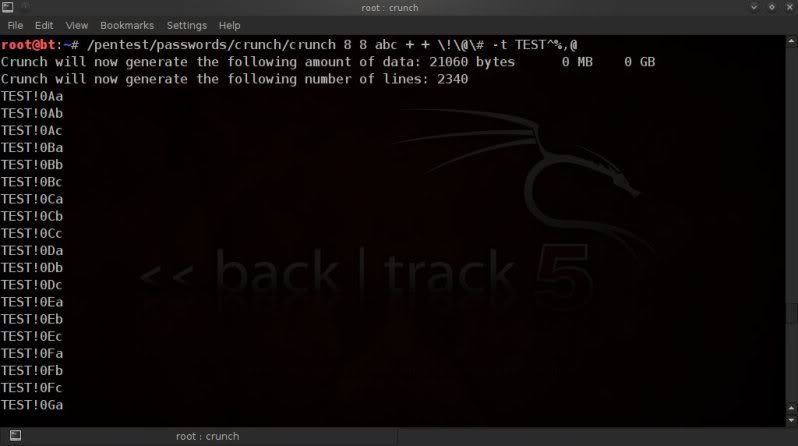
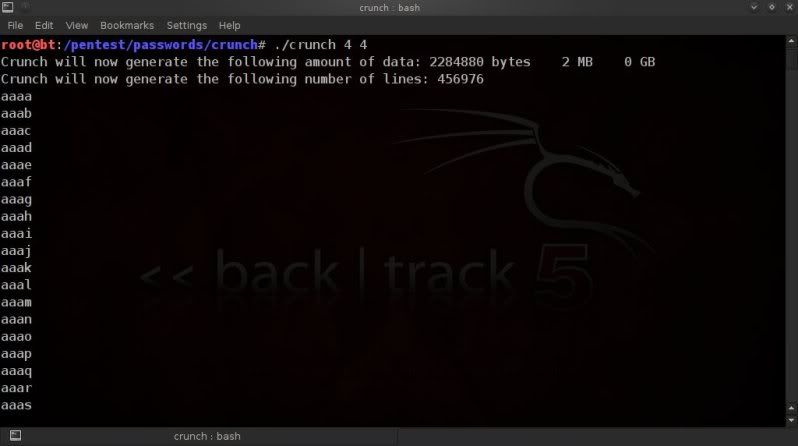
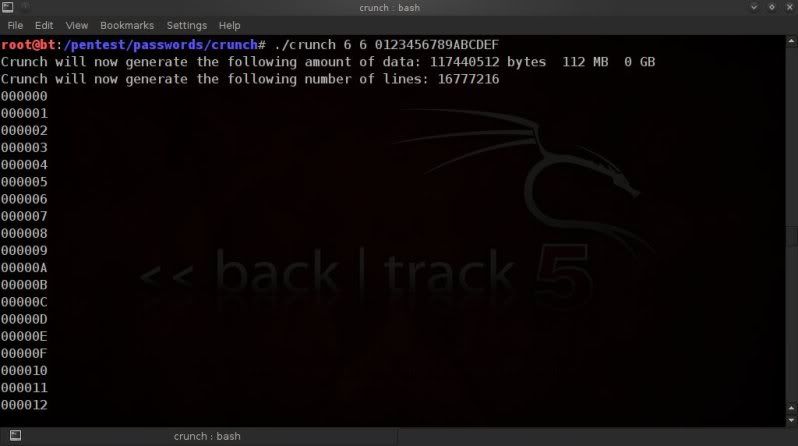
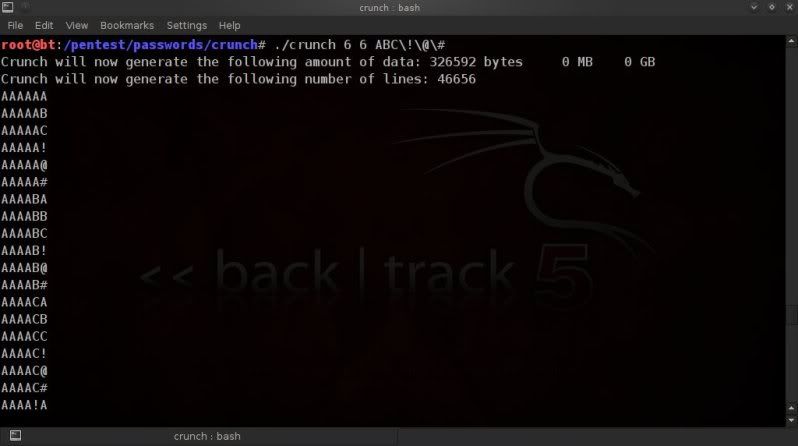
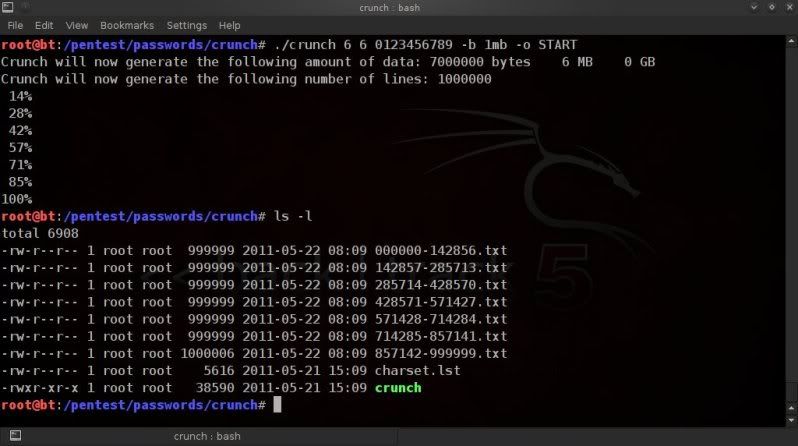
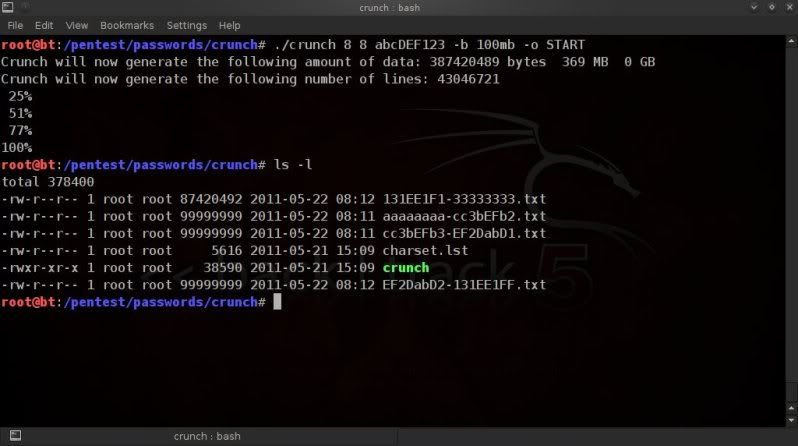
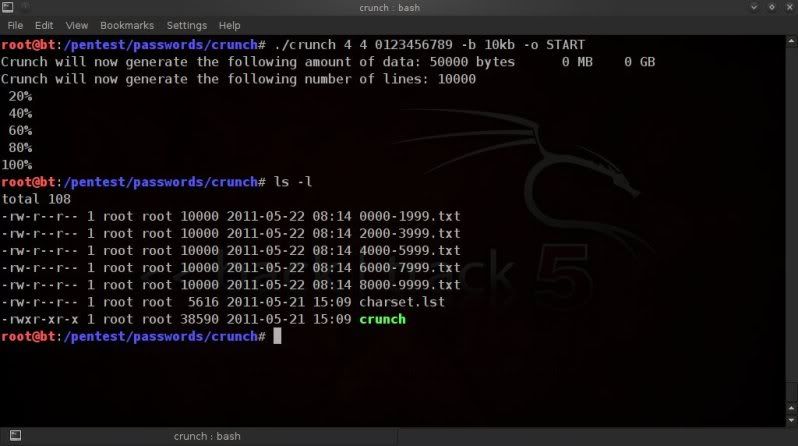

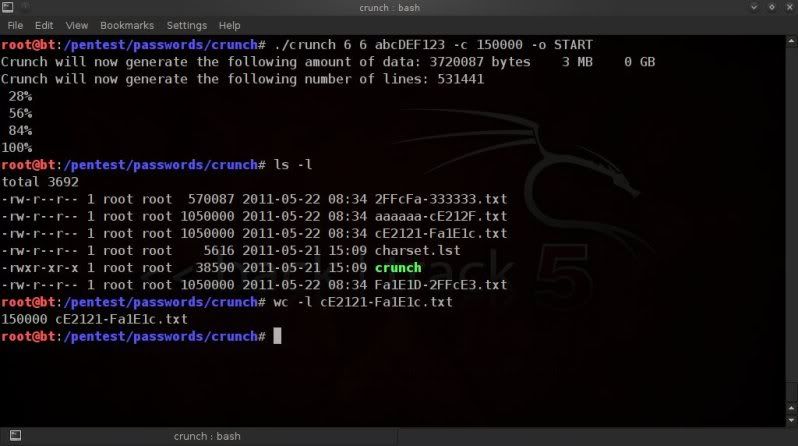
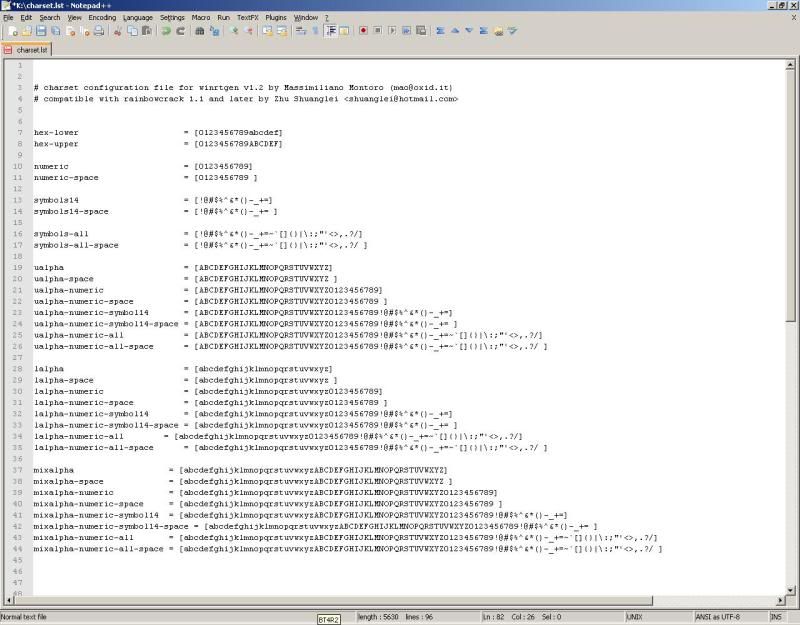
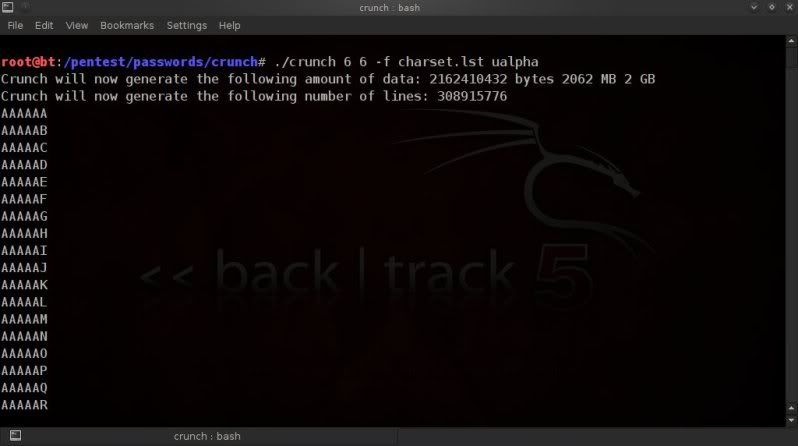
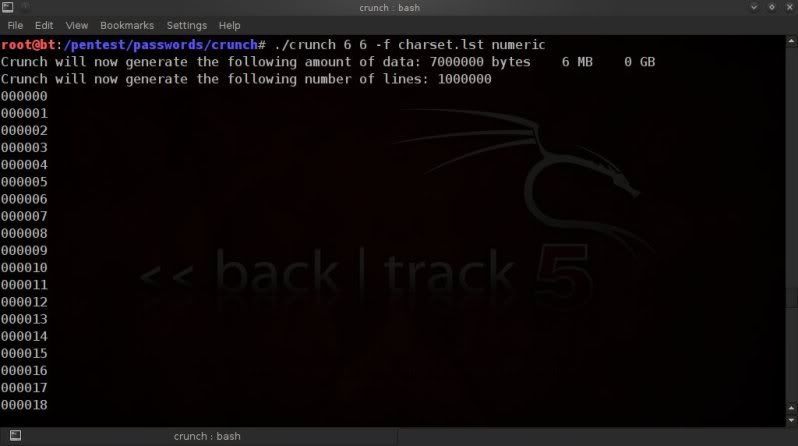
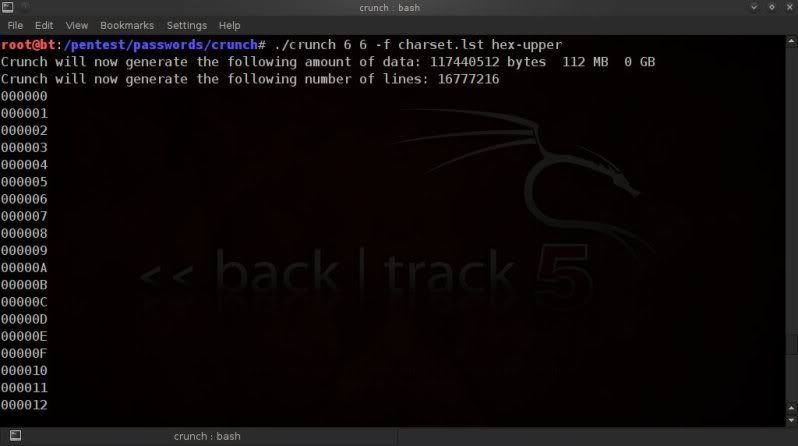
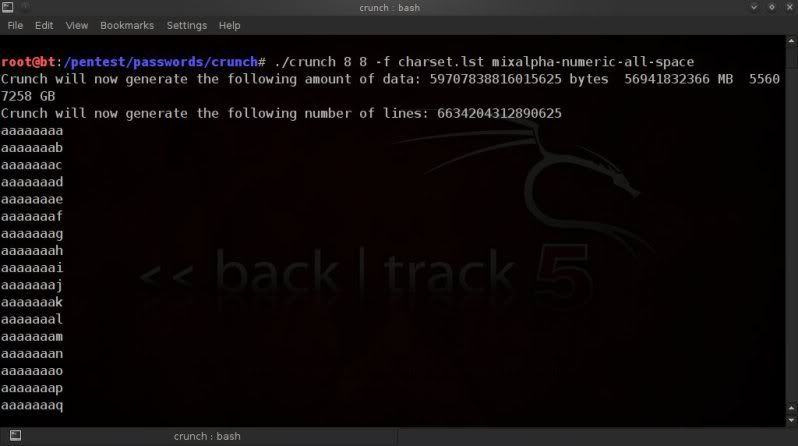

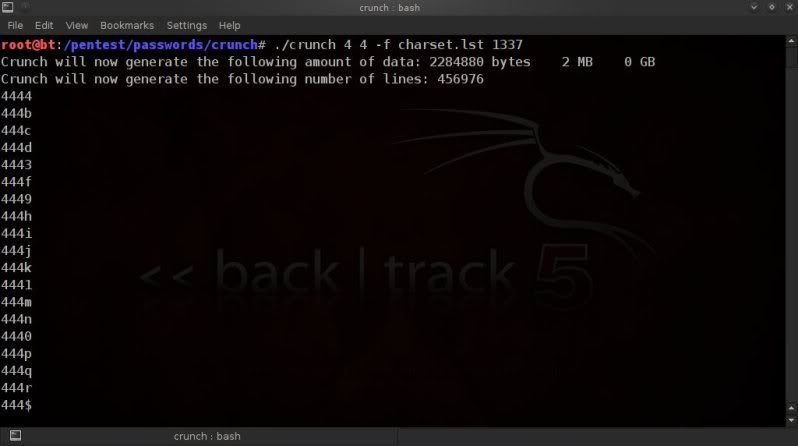
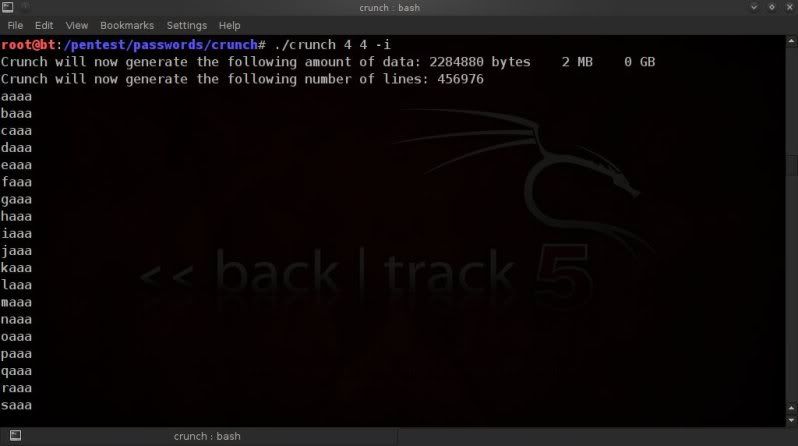
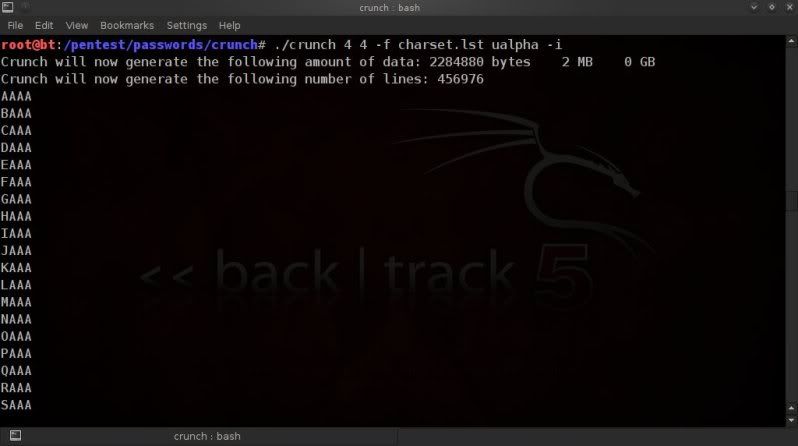
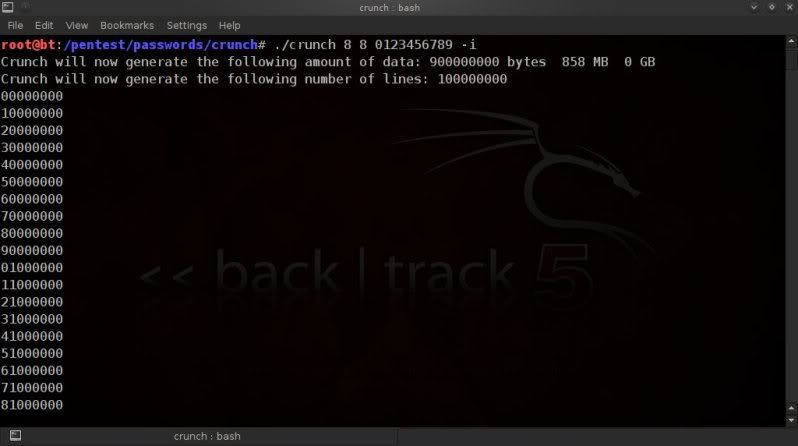
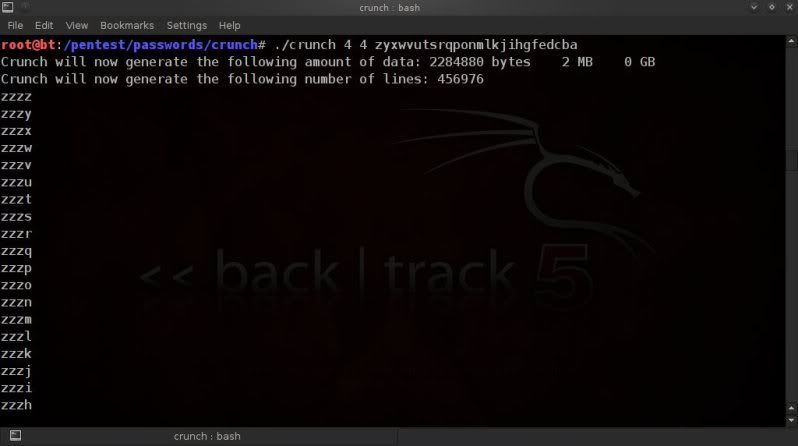
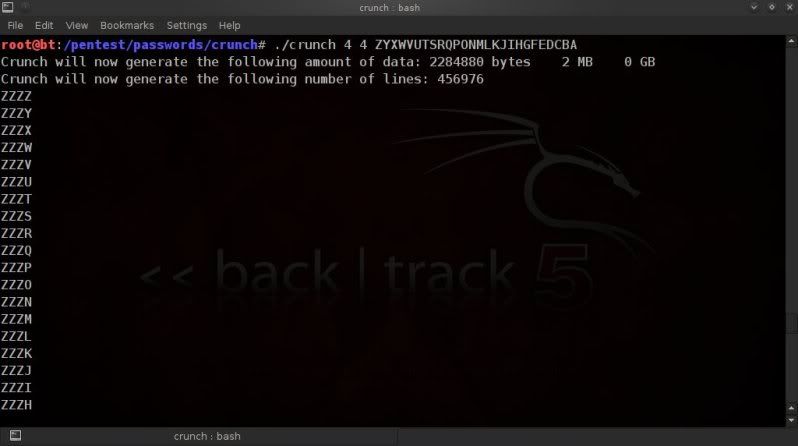
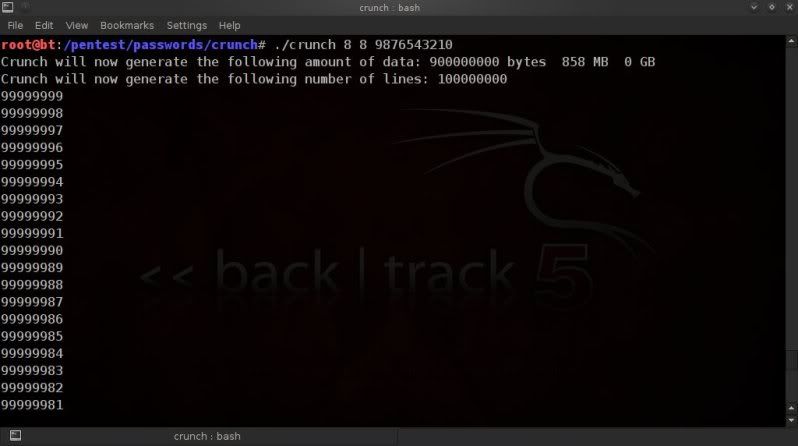

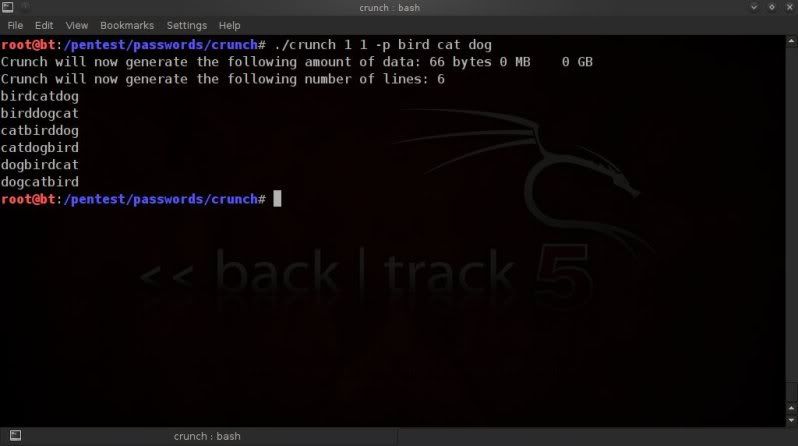


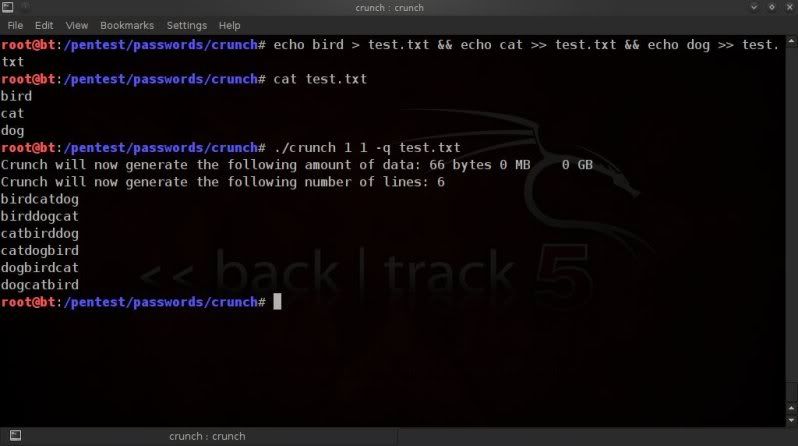
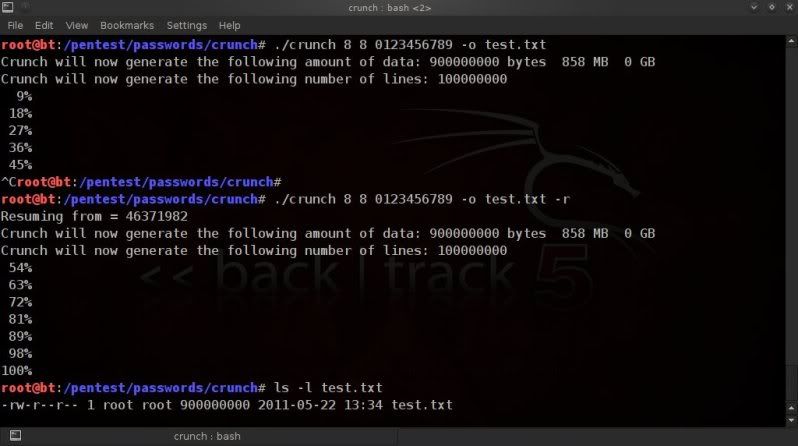
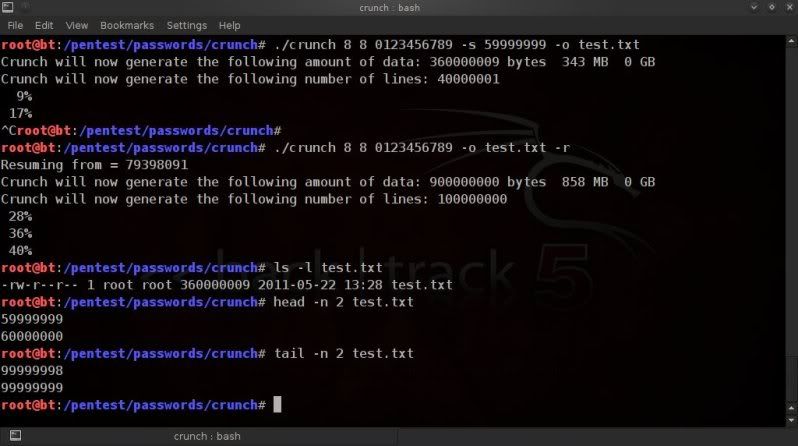

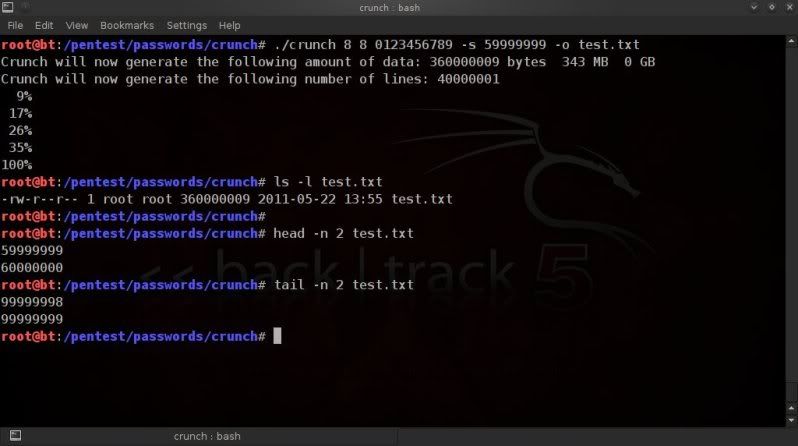
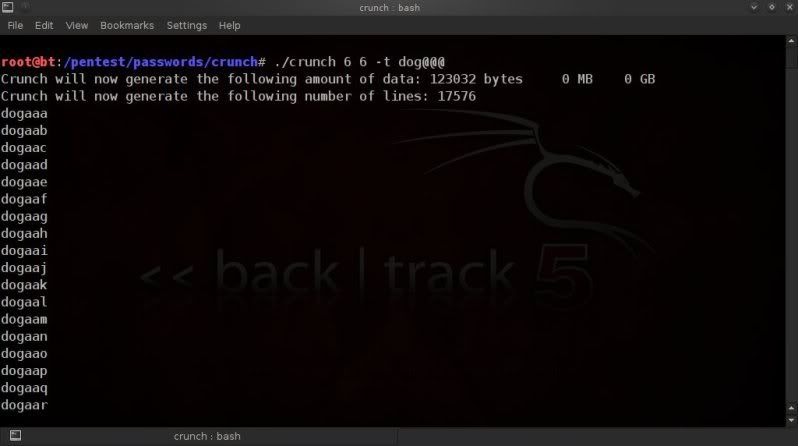
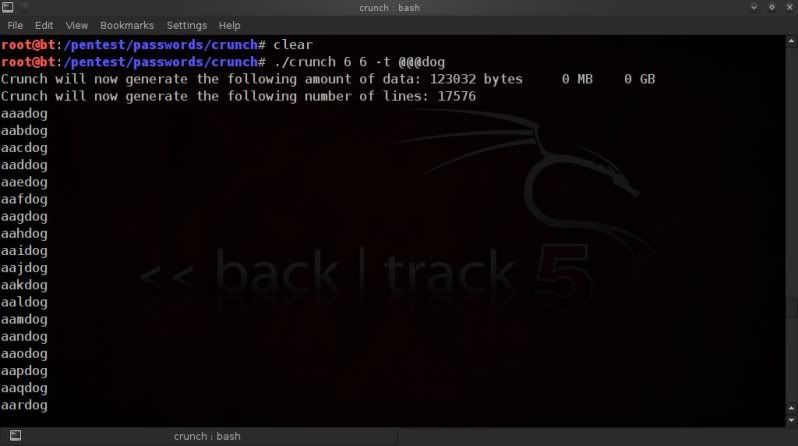

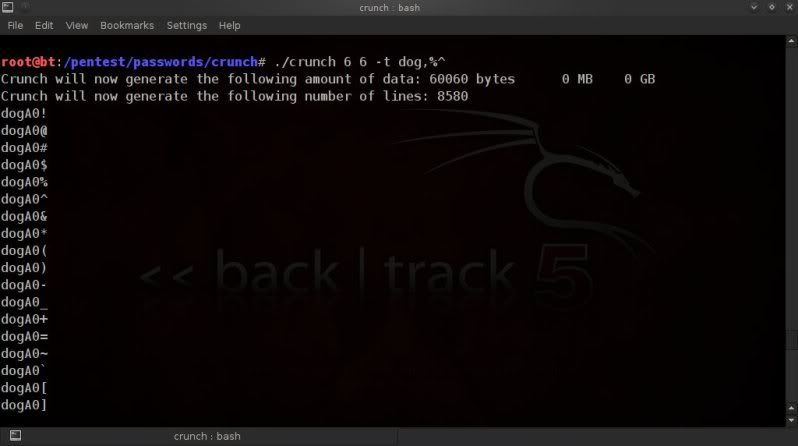
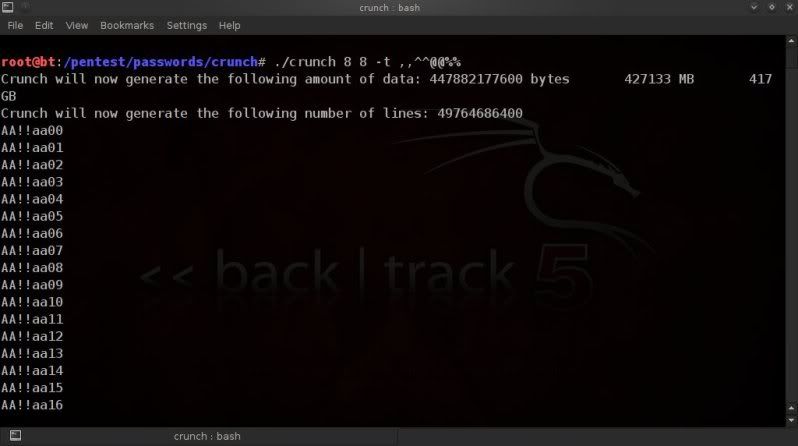

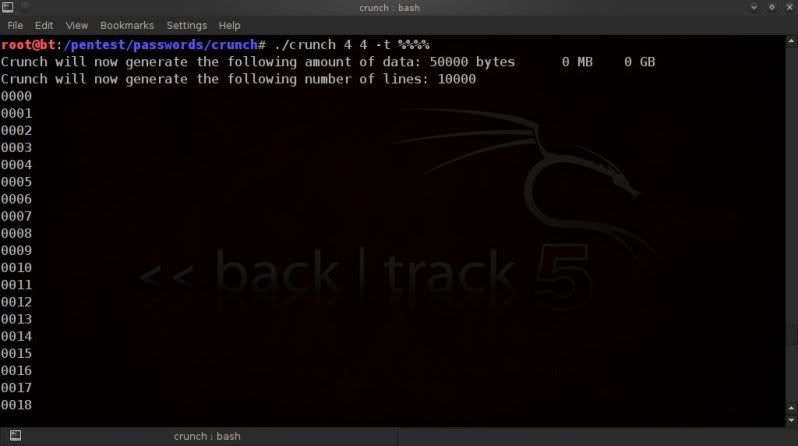
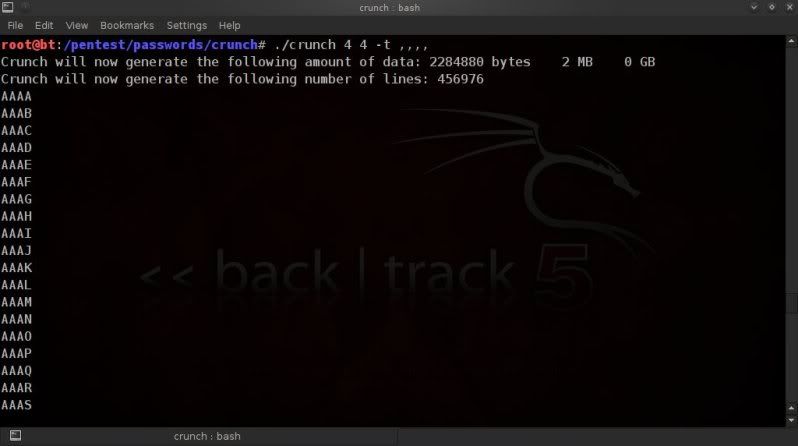

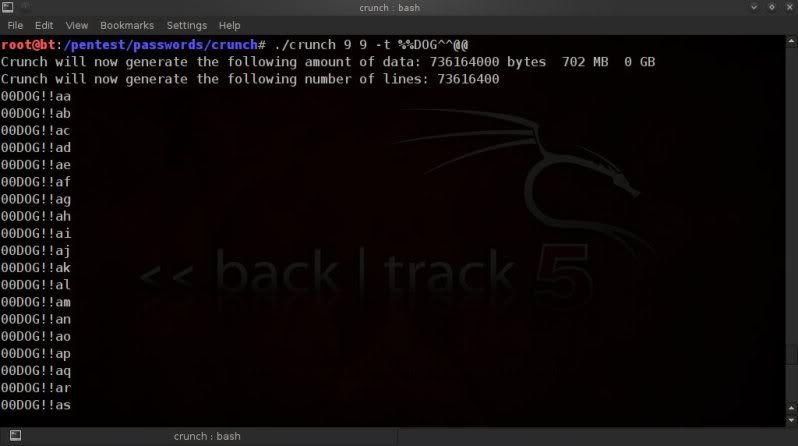



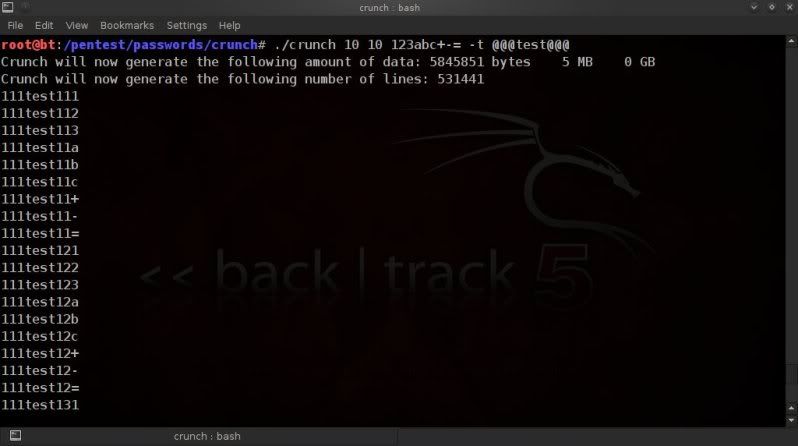
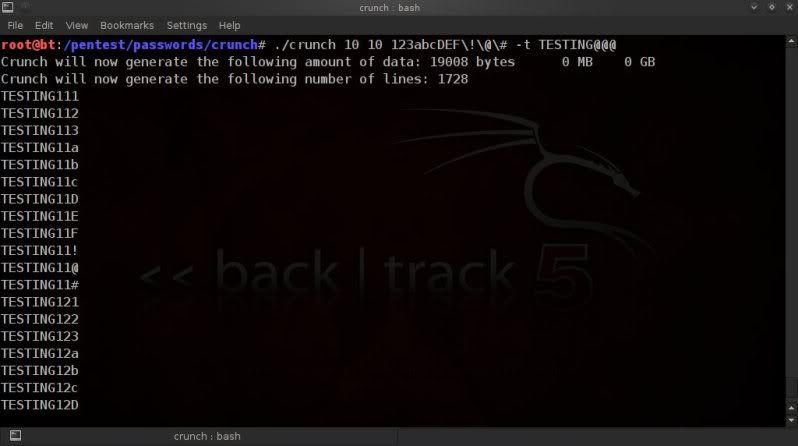

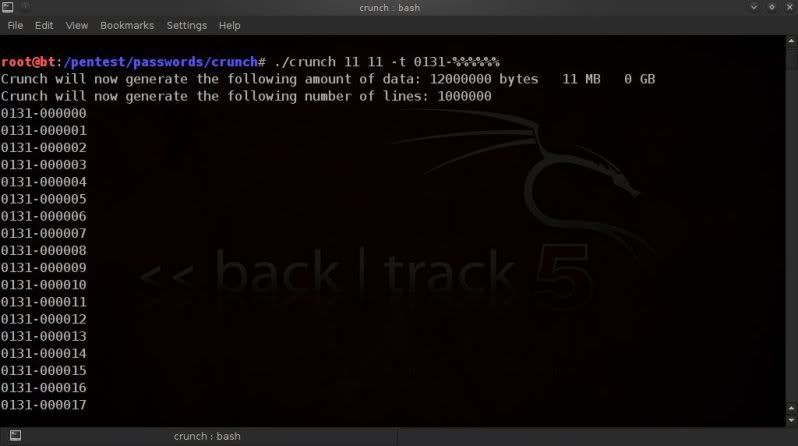
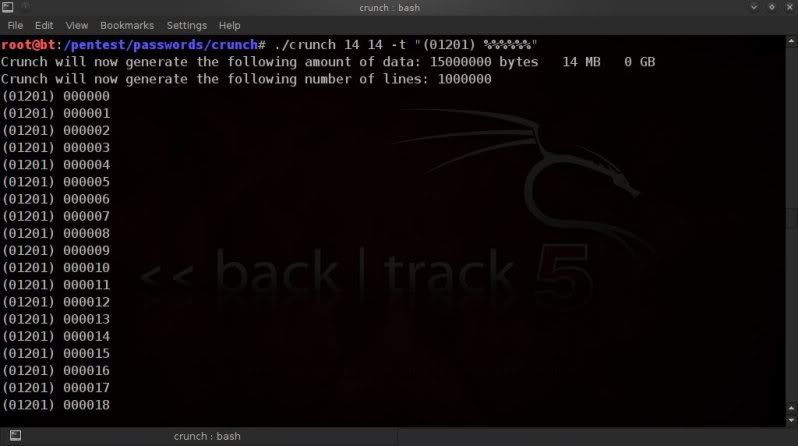
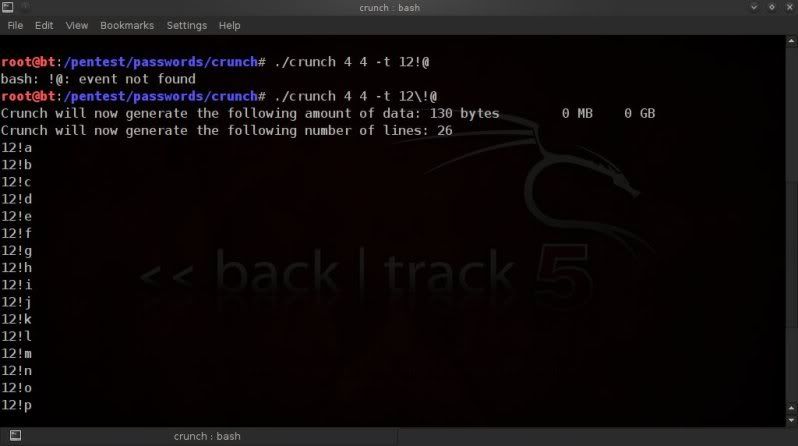


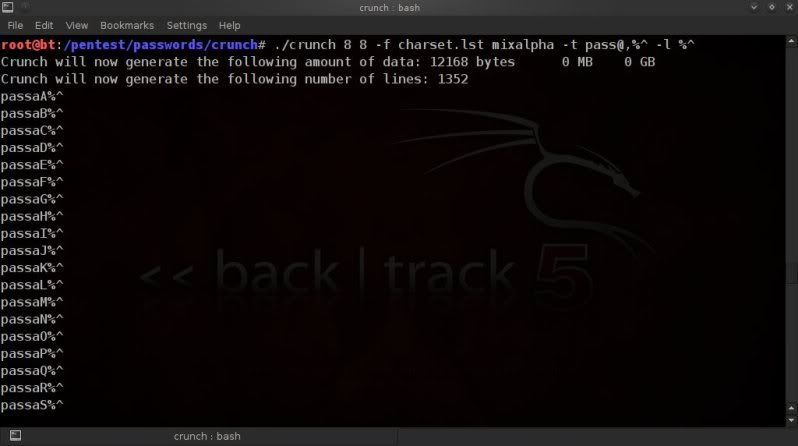
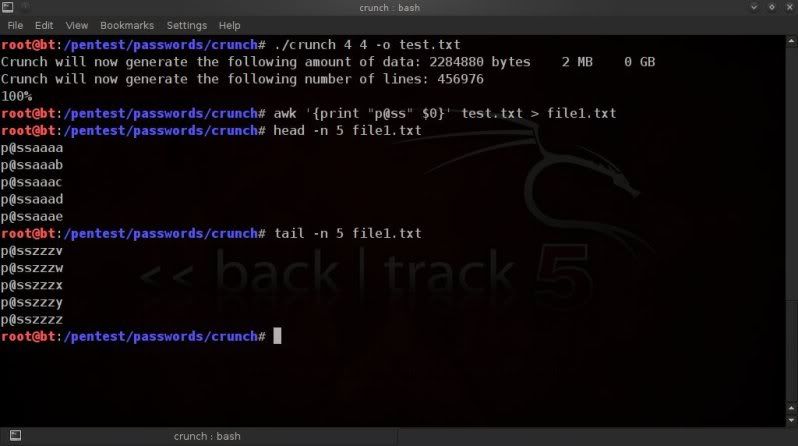
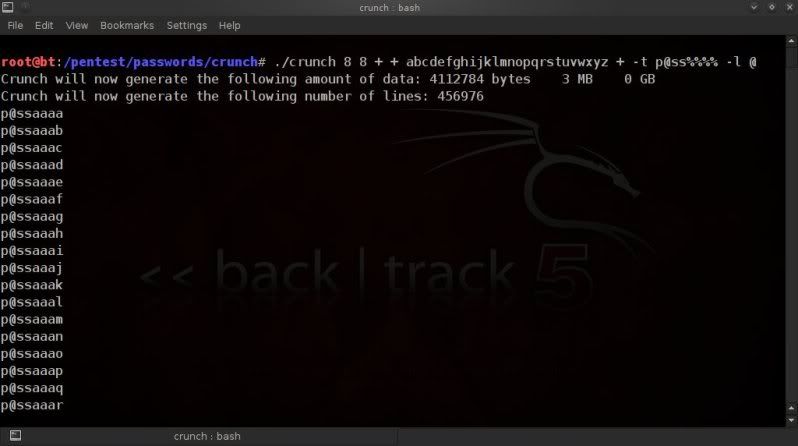
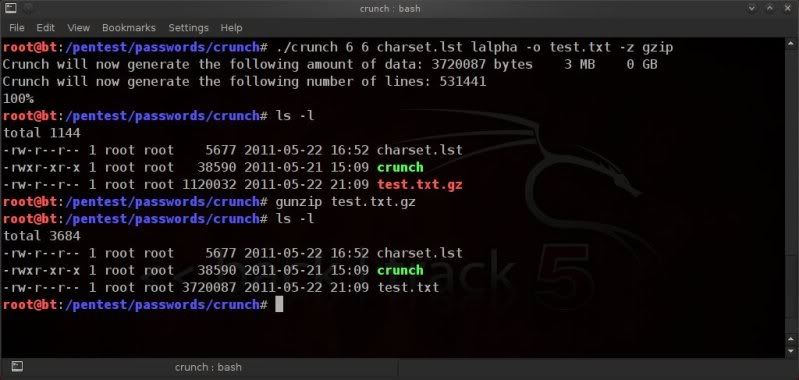
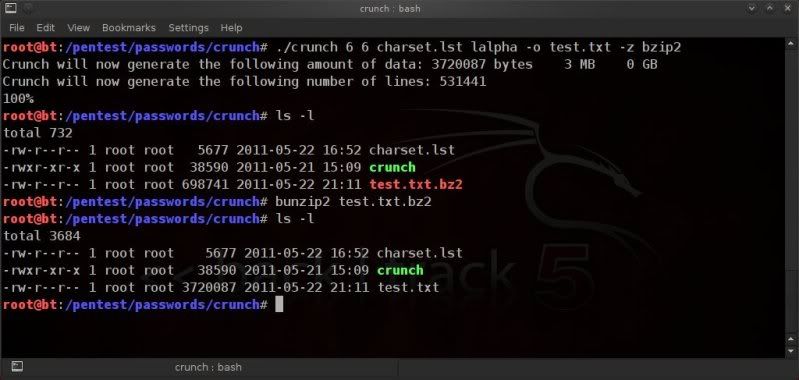

admin@ubuntu-laptop:~/Downloads/crunch3.0$ sudo make && make install
ReplyDeletemake: Nothing to be done for `all'.
Creating directories...
/usr/bin/install -d -m 755 -o root -g root /pentest/passwords//crunch
/usr/bin/install: cannot create directory `/pentest': Permission denied
make: *** [install] Error 1
Yah...
ReplyDeleteDoesn't look like you tried to install on backtrack..
The above guide is for installing and using on backtrack.
I have not tested crunch on any other platform.
Have you tried simply ensuring to first create that directory ;
/pentest/passwords/crunch/
?
Correct its ubuntu 11.04
ReplyDeleteHoped they as they are debian cousins it was worth a shot - will document any success.
If i manually created the directories, the installation halt on a different error.
/usr/bin/install: cannot change owner and permissions of `/usr/local/share/man/man1': No such file or directory
make: *** [install] Error 1
To be honest I'm afraid I cant help you much with this, however I would be interested to hear your progress.
ReplyDeleteI can't really suggest to try to create that directory as well, as don't know whether it may mess up any part of your installation..
But anyways, let me know how you progress ;)
Ubuntu seems to use location
ReplyDelete/usr/share/man/man1
Made a softlink to that location and then the install moved on.
Also needed to create a crunch file
/pentest/passwords/crunch$ sudo touch crunch
It seems to install okay then
Succesfully made the test file - only didn't get any fancy text output to the terminal with the results.
root@ubuntu-laptop:~/Downloads/crunch3.0# /pentest/passwords/crunch/crunch 8 8 abc + + \!\@\# -t TEST^%,@ -o test.txt
Crunch will now generate the following amount of data: 21060 bytes 0 MB 0 GB
Crunch will now generate the following number of lines: 2340
100%
When you tried to install, did you also try
ReplyDeletesudo make && sudo make install
or only
sude make && make install
?
Seems strange that you would have to create a file called crunch...
Seems like its working though, if you want printout to screen, just dont write to file with the -o switch.
./crunch 8 8 -t %%%%%%%%
Hi Tape (very nice post and sorry for my English :-)
ReplyDeleteI want to create an hex word-list with 4 letters 4 numbers but with not fixed locations for example:
ea475df8
432abfd7
is that possible?
thnx in advance!
Hey there d.posnas,
ReplyDeleteGlad you liked the post !
There are a couple of ways to do that ;
./crunch 8 8 0123456789abcdef -t @@@@@@@@
./crunch 8 8 -f charset.lst hex-lower -t @@@@@@@@
Remember the size will still be considerable...
If you know certain fixed locations (such as first character being a number or letter) you could narrow the possibilities down a bit more.
EXCELLENT LEVEL OF DETAIL..HIGHLY IMPRESSED.
ReplyDeleteby evan
Thanks for the kind words :)
ReplyDeleteGlad you liked the post !
Yes that's the point. I know that the password is hex with 4 letters 4 numbers (8 total) but I don't know the exact location of each character. Could be 1547abcd or de45fa78. Is there any kind of technique to achieve the creation of that word-list?
ReplyDeleteUsing "./crunch 8 8 0123456789abcdef -t @@@@@@@@" will achieve all the possible combination
and
./crunch 8 8 0123456789abcdef -t %%%%@@@@ will achieve fixed location.
Any Suggestions?
Hey there d.posnas,
ReplyDeleteI now get what you mean, no more than 4 digits, no more that 4 alpha values.
Crunch cannot do that straight away as far as I can figure out, would probably require a script to be run over the file to remove lines that dont follow the criteria.
Will have a look and see if I can come up with something later.
Not sure to be honest.. I suspect I may have used a different sudo command.
ReplyDeleteSudo -s not an expert on sudo but I think using the shell comand means it accesses a different set of default data.
Hi, just a side note for those new to Linux. If you get a "Couldn't find package" error when you try to install Crunch via apt-get, that means your apt-get package info is outdated, and you need to retrieve new lists of packages. Just enter this:
ReplyDeleteapt-get update
Then try to install Crunch again:
apt-get install crunch
Thanks Chan,
ReplyDeleteOf course you are correct to always to an "apt-get update" before checking.
I will edit post to reflect this.
Thanks !
HOW DO I CAN USE THE LETTER -r
ReplyDeletePLEASE I DON'T NOT HOW I CAN USE
THANKS SO MUCH..
The -r switch is used when resuming wordlist creation.
ReplyDeleteSo if you start creating a wordlist, but have to stop the generation for whatever reason,
you can resume the wordlist creation with the -r switch to continue from where your previously had stopped.
So when normally creating a wordlist you would not need to use the -r switch.
Hope the above makes it clearer, but the post above explains it all fairly well I would think..
anyone got this working on a Redhat box?
ReplyDeleteI have not heard of people trying it, however bofh28 was advising that as long as you
ReplyDeletecan create the required directories (installing as root) that it should work on most distros.
Give it a shot and let us know the outcome!
I have a quick question:
ReplyDeleteI was wondering if it was possible to make a wordlist of 8 key length with all combinations of the alphabet but not having any of the same keys being next to each other.
So instead of starting:
aaaaaaaa,
it would be abcdefgh and the same letters would never be next to each other???
from crunch 3.2 with -d 0@ no duplicates of the same letter will be next each other
DeleteHi there noslide,
ReplyDeleteI am afraid to say that crunch is not able to do that.
This question has come up in the past quite a few times, so I should probably really have a
look into a bit of code to help do that, but I am aweful with the sed / awk stuff ;)
Hi TAPE,
ReplyDeleteWould you please help me with this case:
Password contain 10 digits: beginning with "09", next digit can only be "0", "1", "3", "4", "7", "8"; and the last 7 digits will be random.
For example:
090xxxxxxx
091xxxxxxx
093xxxxxxx
etc...
Is it possible to make a wordlist like that by using crunch ? Please help. Thank you a lot :)
Hey M150,
ReplyDeleteYes it is possible, but you have to 'trick' crunch by tweaking the charsets ;
./crunch 10 10 + + + 013478 -t 09^%%%%%%%
So in the above, we have told crunch to use the charset '013478' as the charset for which normally special characters are used (the ^ position)
Still will be a 629mb wordlist !
Hope it works for you !
Hi d.posnas, the example you gave,
ReplyDelete./crunch 8 8 0123456789abcdef -t %%%%@@@@
would not produce the results you expect. Try this cut-down example and you will see that it produces more digits and letters than you expect:
./crunch 4 4 01ab -t %%@@
You would be expecting only 16 passwords but instead you'll get thousands, including all-digits and all-letters.
To get something closer to what you want, try this:
./crunch 4 4 01 + ab -t %%@@
Search for "placeholder sign" in Tape's tutorial above for more info. So, to make your example work, it needs to be:
./crunch 8 8 0123456789 + abcdef -t %%%%@@@@
I don't recommend you run this yet though! This will take a long time to execute and will produce millions of lines! Better to run your tests with cut-down examples first.
Anyway, this is an interesting pattern, and I am working on a more complete solution for producing such a word list.
Id like to say great job... I have installed on opensuse 11.4 with no issues. I installed 2.9 which i ran this command
ReplyDelete./crunch 10 10 abcdefghijklmnopqrstuvwxyzABCDEFGHIJKLMNOPQRSTUVWXYZ1234567890 -z gzip - START -b 2Gb
This did as it says on the tin it creates zip gzip files fills up START then creates the specific compressed file.
How ever when i run this same command using crunch 3 It never creates a zip i get this message
gzip: aaaaaaaaaa-aaaaayLWAM: no such file in directory
The text file is in the folder but for some reason its not compressing it... This is only in the latest version.
keep up the good work I will try on BT5 once i have enough space...
Thanks and keep up the good work
Oh dear, thanks for your comment Dave, perhaps a bug slipped through as the previous version had an issue with creating certain filenames as well.
ReplyDeleteI will do some testing on larger files and see if I can replicate your problem so that can ask bofh28 to look into it.
Thanks !
No Worries great tutorial as well...
ReplyDeleteThere is alot there i didn't know crunch could do :)
As i said keep up the great work :)
Hey Guys!
ReplyDeleteI would like to know if it's possible to kick directly some kind of keys?
I mean (for example with : /crunch 05 05 abcde)
I want to kick all keys with AT LEAST 2 same caracters one next to the other, like:
aaxxx
xbbxx
xxccx
xxxdd
aaaxx
bbbbx
ccccc
ect ...
Thx for your help :)
Heya FoX, yes its possible ;
ReplyDeletesed '/\([^A-Za-z0-9_]\|[A-Za-z0-9]\)\1\{2,\}/d' wordlist.txt
I am trying to work on a new post which will show simple one liners to do the mostly used wordlist fine tuning.
Stay tuned !
Hey TAPE,
ReplyDeleteThx!!!
I would like to know if it can work something like that :
/pentest/passwords/crunch/crunch 26 26 abcdef12346790 --stdout | aircrack-ng -0 -e "ESSID" -w - out-01.cap
Because I find really boring to create and use a wordlist... When we can test directly word created :D
Thx again for your help ;)
Sry for my double post but I simply done :
ReplyDelete/pentest/passwords/crunch/crunch 09 09 backtr --stdout | sed '/\([^A-Za-z0-9_]\|[A-Za-z0-9]\)\1\{2,\}/d' | aircrack-ng -0 -e "ESSID" -w - out-01.cap
And it works great ! :D 45mins to 15 ^^ (bad proce...)
Can you just tell me how works :
sed '/\([^A-Za-z0-9_]\|[A-Za-z0-9]\)\1\{2,\}/d'
I mean, if I do not want to kick at least 3 but 2 sames caracters one next to the other. Or if I want to add special caraters like ^<>/:.
Once more time : Thanks !!!!! You saved me ! ;)
Heya FoX, dont worry, this is a blog, not a strictly administered forum.. double post all you want ;)
ReplyDeleteThat one-liner should also take care of more than 2 numbers / special characters..
When I get to the post on wordlist manipulation I will try to dig into more detail to adjust to be more flexible.
For the time being, you have your example, play with it :D
By the way, you dont need to use the --stdout, you could simply include the -u switch instead and I have not actually experienced problems when not specifying that at all..
Hey TAPE,
ReplyDeleteA blog yes, but I find more solutions in, than some kind of forum :D
I have some more questions for you :$
sed '/\([^A-Za-z0-9_]\|[A-Za-z0-9]\)\1\{2,\}/d'
kicks me 3 same or more caracters, I have done that for 2 caracters:
sed '/\([^A-Za-z0-9_]\|[A-Za-z0-9]\)\1\{1,\}/d'
And it works! :D
But I have a problem with this.
If I try :
/pentest/passwords/crunch/crunch 20 20 abcdefghijklmnopqrstuvwxyz -u
All works, I see code lines running on the shell.
But if I do :
/pentest/passwords/crunch/crunch 20 20 abcdefghijklmnopqrstuvwxyz -u | sed '/\([^A-Za-z0-9_]\|[A-Za-z0-9]\)\1\{1,\}/d'
Nothing happens ... (even with {2,\})
It only works if I do :
/pentest/passwords/crunch/crunch 20 20 abcdefghijklmnopqrstuvwxyz -u | sed '/\([^A-Za-z0-9_]\|[A-Za-z0-9]\)\1\{18,\}/d'
It will kick all 19 same letters ( as aaaaaaaaaaaaaaaaaaab) and I will see code lines on shell.
(It also works with :
/pentest/passwords/crunch/crunch 03 03 abcdefghijklmnopqrstuvwxyz -u | sed '/\([^A-Za-z0-9_]\|[A-Za-z0-9]\)\1\{1,\}/d')
I have try to create a wordlist.txt for kicking lines later but ... 26^20 makes Billion of Go :D (or something like that ^^)
What should I do to make it works with {1,\} and crunch 20 20?
(do not tell me "change your computer" pls ^^)
it is normal 'cause creates wordlist from aaaaaaaaaaaaaaaaaaaa: so all pw up to abababababababababababab will be never been displayed
DeleteHeya Fox, glad you liking the blog :)
ReplyDeleteI am gonna have to ask you to wait until the next post is out so I can do more testing my side and
come back with a working solution.
(my next post will be covering this like this, I hope :D )
I know that bofh28 is working on having this type of thing included in a future revision, so keep yr eyes peeled for new crunch releases.
Ok no problem :D thx for your help :)
ReplyDeleteI ll wait the next post :)
In fact, my goal is to simplify wordlists (and do not use wordlist by the way ^^). Because we rarely see keys with 2 sames caracters stuck, and never 3 :D
And for me, test key when it is created is the more easy way (rather than create .txt of couple Gb ...).
So my solution works great with keys around 6 caracters (but it's useless ^^), I want it to work with 20 caracters :D.
Thx again :D
I ll wait your post. I hope you ll be able to reacj my goal, even if it s by an other way :)
Ah.. I think I get what you were asking now..
ReplyDeleteHow to increase the speed / decrease the time of checking the passwords piped through crunch..
Well, different methods of wordlist creation are not going to help you... you would have to look into the use of Pyrit together with CUDA or possibly the ATI alternative ATI stream.
To be honest, cracking a 20 character random password.. good luck with that.. ;)
is there a way to take a pw list and do alfa set combined by 4 numbers after each password?
ReplyDeleteexample
@smith@@@
or would i have to do each task separately?
Ahh.. well I know its possible, but would need to do some testing.
ReplyDeleteFor the moment I think you will have to work on it manually while I try to get the little grey cells working again..
I am in the process of making a new post on wordlist manipulation which will cover this kind of thing.
stay tuned !
Hey TAPE,
ReplyDeleteDo not think I am crazy :D
Yes I wanna crack around 20 - 23 characters random password ... But I know the pattern of thats keys : Like 23 only Hex caracters or 20 with 19 min alpha + 1 number ect ...
So for me, it's cleary possible to accelerate and be able to crack a random key by kicking the most of useless keys tested :) (because I know the pattern and I don't need to test all caracters possible!)
I suppose
/pentest/passwords/crunch/crunch 20 20 abcdefghijklmnopqrstuvwxyz -u | sed '/\([^A-Za-z0-9_]\|[A-Za-z0-9]\)\1\{1,\}/d'
doesn't work beacause crunch probably creates the list before apply "sed" ...
I must find a way to generate keys wanted instantly...
Is that possible with Pyrit and CUDA?
First of all, generating a crunch list of
ReplyDeletecrunch 20 23 abcdef0123456789 -u
Is going to do you better for hex than what you're trying to do with sed. If you know your pattern, why screw around. So first run, try it like that, you know your pattern, work with it.
If you're trying to generate with a minimum of a number anywhere in the place, TAPE and I have tossed a couple of one-liners at each other for doing so, but out of the box crunch won't do it.
However, when you pipe from crunch to a small sed/awk command you are not putting that much load on the system. Generating the entire crunch list takes time, but if you're not writing it to disk it takes significantly less time than you might think (just like printing it to screen takes more time than not). There are some things crunch is incapable of doing - things which should remain that way for it to hold its true programming form. Crunch to sed/awk to clean the list to aircrack/pyrit will still reduce your cracking time ridiculously large amounts.
The voice of reason returns :D
ReplyDeleteThanks for your comments and further explanations Gitsnik.
Hey guys,
ReplyDeleteI`m looking way how to create UPPERCASE 8 8 charters with ZXCVBNMASDFGHJKLQWERTYUIOP letters, and don`t want also SAME letter on each line.
Like AAAAAAAB AAAAAAAC and so on...
OK i know that crunch cant do that.
But if i will create (by my self, or maybe i can do that with crunch help) all 208 possibilities with 8 charters.
Example: QWERTYUI WERTYUIO ERTYUIOP RTYUIOPA AND SO ON AND SO On whle i will get all possibilities with keyboard. (do you know what i mean? yes HARD WORK)
Then use crunch 208 times (thats what i think..maybe i am wrong) and create 208 word lists without same letters on each line. using this command:
./crunch 1 1 -p QWERTYUI -o test_full.txt
cat test_full.txt | cut -c -16 > test_10.txt
and another
./crunch 1 1 -p WERTYUIO -o test_full2.txt
cat test_full2.txt | cut -c -16 > test_10.txt
AND 208 TIMES MORE :)
maybe i`m wrong, correct me.
Or just suggest HOW i can make that wordlist.
Thatnk you and sorry for bad english
Hmm tricky one there Arthur. Lucky for you, as tape well knows, I like me a quick challenge.
ReplyDeleteIt may have been a bit lost in translation though, so tell me if this simple perl script does it for you or not.
http://gitsnik.blogspot.com/2011/08/unique-characters-from-crunch.html
Hey Gitsnik ! Awesome work ;)
ReplyDeleteYou do realise of course I am gonna steal everything you write for a new post :D
Hahaha go nuts. So long as it's useful to someone.
ReplyDeleteFor reference to anyone who reads this, you could just as easily embed a bunch of for loops by hand to generate the list, and on something this small that would probably work out faster and more efficient, but if you want to use crunch then that's what the script is for. Yes, you can do it better/simpler. But we want to use the one tool for as many jobs as possible.
Hey TAPE, I really need your help! Im trying to install crunch to backtrack and when I write:
ReplyDeleteapt-get install crunch-3.1
Everything looks find untill:
"E: Cannot find file or something"
I downloaded it on windows xp and put it on usb then i put it on the desktop on bt 4 from my usb. PLEASE HELP! I AINT GOT A CLUE!!!
Using ;
ReplyDeleteapt-get install crunch
should work fine (as long as you are online in backtrack of course).
otherwise the manual install instructions in the beginning of the post should work fine..
hi TAPE,
ReplyDeleteyour work on this blog is fantastic, and i really appreciate for what you doing for ppl, so big thank you and even i know thank you is not enaugh for what you doing, and the best of all it's free :-)
i have been folowing your blogs all the way, i never had a chance to ask, so this is my first question, as they say, if you don't ask, you don't get :)
i come cross this linck http://gitsnik.blogspot.com/2011/08/unique-characters-from-crunch.html psted by Gitsnik and many thanks to him for the code, but the problem is he likes the challenge but he is not a charity :-) well i respect he's thoughts of course that's why i couldn't bother to ask him how the code should be done with crunch, i love crunch and would love to know if Arthur question can be done with crunch and the code mentioned by Gitsnik can create UPPERCASE 8 8 characters like MDFHGZN ARDFTHKB NFRKNLET...ect not like AAAAAAAA AAAAAAAB AAAAAAAC...ect your help will be appreciated and thanking you in advance
please don't mind my english :-)
kind regurds Issac
Gitsnik has been and is still a great help to me on many occasions.
ReplyDeleteMy backtrack system is out of comission for a bit so cant here to show you and to ne honest I think a little more digging your side will be of a much greater benefit to you rather than me cutting and chewing your meat for you ;)
Impressive.
ReplyDeleteGood job.
hello again, Thanks Gitsnik you very much for script, it WORKS! perfect!
ReplyDeleteI tested it with small wordlist ./crunch 8 8 -f charset.lst ualpha -o skyuk.txt
after used perl script ./name.pl skyuk.txt and its printed me that what i need. (i just tested, i dont know how to make list whitch i need ./crunch 8 8 -f charset.lst ualpha -o skyuk.txt without same letter on each line)
Now please, Gitsnik, TAPE, anybody can you write me who i should type to get it?
Or i should make 1750 GB wordlist and use you script after?
Or how i can integrate all that into pyrit?
Please guys, your work is awesome. please save me my time.
I promise to create step by step guide to do all that, because i know many people need that, because many people started using backtrack to do wpa cracking.
PLEASE :)
Waiting for replay...
It`s me again. Miricle, i found way how to do that. But now is another problem, i hope some help still.
ReplyDeleteif i type:
./crunch 8 8 ZXCVBNMLKJHGFDSAQWERTYUIOP | perl gen.pl >> '/media/Local Disk/skypass.txt' i`ll get:
Out of memory!
i have over 700GB free memory now, is that wordlist that big?
Even if i try crunch 6 6 i`m out of memory, crunch 5 5 works fine.
Another question:
that works perfectly:
./crunch 8 8 ZXCVBNMLKJHGFDSAQWERTYUIOP -u | pyrit -i - -r/root/Desktop/talk-01.cap -e TALKTALK-6CD1FC attack_passthrough
but that would be 1750 GB wordlist tested its a bit to long with 90 000 keys/sec.
Any posibility to integrate that Perl script here? or should i add in script something?
Example which of course dosnt work for me:
./crunch 8 8 ZXCVBNMLKJHGFDSAQWERTYUIOP | perl gen.pl -u | pyrit -i - -r/root/Desktop/talk-01.cap -e TALKTALK-6CD1FC attack_passthrough
Can't open -u: No such file or directory at gen.pl line 3.
Pyrit 0.4.1-dev (svn r308) (C) 2008-2011 Lukas Lueg http://pyrit.googlecode.com
This code is distributed under the GNU General Public License v3+
Parsing file '/root/Desktop/talk-01.cap' (1/1)...
Parsed 6 packets (6 802.11-packets), got 1 AP(s)
Picked AccessPoint 00:e0:4d:6c:d1:fe automatically...
Tried 0 PMKs so far; 0 PMKs per second.
Password was not found.
PLEASE :)
I`m idiot... i just now realize that you give me script to do:
ReplyDelete./crunch 8 8 ABCDEFGH | perl gen.pl >> '/media/Local Disk-1/testsize.txt'
BUT not all charters, Right? Just that 8 wich i will type by my self?
./crunch 8 8 ABCDEFGHIJKLMNOPQRSTUVWXYZ will generate what, about 1750GB of data, so you have to figure that that much is getting used somewhere. If you run it as ./crunch blah -u | perl gen.pl | pyrit you should get every combination of 8 characters which are totally unique, including ABCDEFGH and ABCDEFGI and ABCDEFGJ and so on.
ReplyDeleteI threw my i7 at it overnight and didn't have a memory leak, but then I didn't write them to file (via >>), just left them crack over a testcap file (which would never work because the password has a duplicate character in it).
Also don't add -u to the script, no idea why you are doing that. ./crunch 8 8 charset -u | perl gen.pl | pyrit blah
Thanks Gitsnik, you are my last hope...
ReplyDeleteWell that -u its my mistake, i removed it before, just copied wrong command.
But it`s starnge i did what you just said:
./crunch 8 8 ABCDEFABCDEFGHIJKLMNOPQRSTUVWXYZ | perl script.pl | pyrit -i - -r/root/Desktop/talk-01.cap -e TALKTALK-6CD1FC attack_passthrough
Then i get(desnt work):
Tried 0 PMKs so far; 0 PMKs per second.
Password was not found.
BUT if i type:
./crunch 8 8 ABCDEFGH | perl script.pl | pyrit -i - -r/root/Desktop/talk-01.cap -e TALKTALK-6CD1FC attack_passthrough
Then i will get (WORKS!):
Tried 40320 PMKs so far; 29200 PMKs per second.
Password was not found
SO it works only with 8 8 and eight letters like ABCDEFGH QWERTYUI MNBVCXZL and so on...
but if i type 7 or 5 or 9 or 3 (any) letters its not working, why?
BUT if i will do that for example:
./crunch 3 3 ABC | perl script.pl >> list.txt
It works! :
ABC
ACB
BAC
BCA
CAB
CBA
If i type:
./crunch 6 6 ABCDEFGHIJKLMNOPQRSTUVWXYZ | perl script.pl >> list.txt
it says Out Of Memory! How its could be? after 5 sec is out of memory??? It not even started...
Same with even:
./crunch 8 8 ABCDEFGHI | perl script.pl
Out of memory!
ABCDEFGHI thats only 9 letters...and out of memory...
Why?
What i need to do? Witch memory i`m am out? :) I`m running BT5 KDE 64 with only 40 GB partition, but trying to export dictionary to another HDD with more that 700GB.
How i make perl script:
Created new txt file, saved as script.pl, edited, pasted you script. saved. Make executable by typing chmod u+x /pentest/passwords/crunch/script.pl
Maybe I did something wrong? (and whats the diference #!/usr/bin/perl and #!/usr/bin/env perl ???)
:) Or need to edit script, i do not really know.
And asking for help.
Thanks in advance!
Whatever it is, it's not the perl, it's not crunch and it's probably not pyrit. I'd be inclined to think that you are using a live cd or something else, or that it's hardware/disk space intensive but anyway:
ReplyDelete2GB RAM, 2.0GHz Intel Core 2 Duo, and a quick 13 second run to wc -l:
bash-3.2$ cat doubles.pl
#!/usr/bin/env perl
foreach my $line (<>) {
my %unique;
my $size = grep { !$unique{$_}++ } split //, $line;
print "$line" if length($line) == $size;
}
bash-3.2$ time ./crunch 8 8 ABCDEFGHIJKLM -u | perl doubles.pl | wc -l
^C
real 0m13.428s
user 0m7.573s
sys 0m1.010s
bash-3.2$
No errors. If I leave it running longer, I still get no errors, but I'm not going to do that when I'm responding to a post.
#!/usr/bin/env perl is strictly a better way of doing it (my perl isn't in /usr/bin/perl for example, so it wouldn't work.
So again, you should be doing something like:
cd /pentest/passwords/crunch
./crunch 8 8 ABCDEFGHI -u | perl script.pl | pyrit pyritargumentshere.
If it's not working for you, but it works on this machine (which is not the machine I developed it on), I'd be leaning towards the OS or how it is booted. YMMV.
...Thanks, Gitsnik, for everythink - time, patient great script!
ReplyDeleteBut its still not working:
./crunch 8 8 ABCDEFGHI |perl script.pl >> /root/Desktop/11111.txt
[ 200.422042] Out of memory: Kill Process 1545 (perl) score 930 or scarifice child
[ 200.427203] Killed process 1545 (perl) total-vm:6117460kB, anon-rss:5878068kb, file-rss@0kB
Killed
Looks like its using 6gb DDR3 memory and get Killed after memory out.
Probaly you was right, i installed my BT5 KDE 64 on my HDD wrong. I remmember i didnt do swap space (maybe thats why).
I have no idea, i will try your script with BT5 R1 end of the week i guess.
I know its not n00bs forum, so i will try sort my problems my self.
Cheers Gitsnik, you great! And thanks TAPE for your great job here.
Get new 500gb HDD, installed from live cd >> instal.sh >> full install BT4:
ReplyDelete/pentest/passwords/crunch# time ./crunch 8 8 ABCDEFGHJ -u | perl script.pl
Out of memory!
0
real 1m50.710s
user 0m8.706s
sys 0m1.700s
Give up!
Don't know what to tell you:
ReplyDeletebash-3.2$ time ./crunch 8 8 ABCDEFGHJ -u | perl doubles.pl
ABCDEFGH
ABCDEFGJ
ABCDEFHG
ABCDEFHJ
ABCDEFJG
ABCDEFJH
ABCDEGFH
ABCDEGFJ
ABCDEGHF
ABCDEGHJ
ABCDEGJF
ABCDEGJH
ABCDEHFG
ABCDEHFJ
ABCDEHGF
ABCDEHGJ
ABCDEHJF
ABCDEHJG
ABCDEJFG
ABCDEJFH
ABCDEJGF
ABCDEJGH
ABCDEJHF
ABCDEJHG
........
AEDJHFGC
AEDJHGBC
AEDJHGBF
AEDJHGCB
AEDJHGCF
AEDJHGFB
AEDJHGFC
^C
real 32m58.859s
user 1m24.171s
sys 0m23.512s
bash-3.2$
Hopefully useful to someone else. Or, now you can see how I did it, you can try to write your own version.
hi Gitsnik, thanks a lot, the script man, it's working :-)
ReplyDeleteYes, its working. BUT...
ReplyDeleteI instaled perl (activeperl) in my Win 7 x64. And i will try my 1.7 GB (only to test) list which i make in Backtrack.
List is made in BT4: Crunch 8 8 ualpha
Lets try to filter unique "words" from that list
and in run cmd:
C:\Perl64\bin>perl C:\Users\My\Desktop\script.pl C:\Users\My\Desktop\ALL 1.7.txt >> C:\Users\My\Desktop\unique.txt
(in script.pl I removed first line to make it work (CAN I?))
And now slowly watching: after 1h 15min i see how my RAM memory runing out, now from 6GB left only ¬950 mb free. And i`m sure proccess would be killed when my memmory ends.
And i think in that 1.7GB word list where is no unique charters. so in unique.txt list would be empty.
Is anybody made FULL wordlist? How many Gigs, LINES it is? I`ll buy it, becouse i`m run out of patient.
Perl using now 4.25 GB RAM memory is that normal?
I have extra 6gb, can run 12gb in total, but i dont think that would help me to filter 1750 GB list.
Strange after 2 hours its still searching unique "words" in 1.7gb and using 5gb RAM memory, 1 gb RAM free. (i`m not out of memory)
But its too long anyway, It would be faster to test all possibilities, without creating list in my case, I guess.
Hi Gitsnik! I found main problem of this perl script. If its short list of words 8 8 ABCDEFGH (144MB) its enough about 3 GB RAM memory to filter with perl script. But if its a bit bigger, 1gb 2gb, when its using swap memory very slow (even if its 20-30gb) and will take ages to finish filtering.
ReplyDeleteScript works, but why its using RAM memory so much?
I have another challange for you :)
For example with:
./crunch 8 8 ABCDEFGH | perl script.pl we get:
ABCDEFGH
ABCDEFHG
ABCDEGFH
ABCDEGHF
ABCDEHFG
ABCDEHGF
ABCDFEGH
ABCDFEHG
ABCDFGEH
...
..
.
HGFEDABC
HGFEDACB
HGFEDBAC
HGFEDBCA
HGFEDCAB
HGFEDCBA
With one ABCDEFGH we making 40320 lines (354.4Kbs) with all unique "words", Right?
So how many ABCDEFGH (QWERTYUI BCDEFGHJ and so) i need to create to get all unique combinations using your perl script after?
In another words i need from unique word list, unique words. Do you understand? :) i guess its not easy, but is that possible?
So when i can make a lot small wordlists.
Thanks in advance
Ok, maybe idea was stupid create a lot of small wordlist, because i guess word list would be about 440GB. So its not a solution.
ReplyDeleteI counted that to get all unique lines from 1750GB word list using Gitsnik perl script, i need about 32 TB Ram or swap space. I need about 18 times more RAM or swap space then wordlist is.
For example 100mb wordlist i need ¬1.7 gb RAM.
What i`m doing wrong? or its should be like that?
I can try use my 1.5 TB hdd only for swap space, to get unique lines with perl script, from 80 GB list. And do same 21 times like that. (1750/80=21.875)
I`m not crazy, i just realy neeed that word list :)
please suggest.
Can that help me somehow?
ReplyDeletehttp://daemoninc.com/SpeedyCGI/
SpeedyCGI - Speed up perl scripts by running them persistently.
is it possible to run somehow Gitsnik perl script in PDL ("Perl Data Language") ? or its totaly diferient?
ReplyDeletehello Arthur
ReplyDeletefirst of all i believe TalkTalk default WPA key not just 8 ualpha, it's a mix of ualpha and numbers, it's like this MH4G63GN OR JE4H2H8K OR DF9CM3AR and so on and mine something like this NGG6BDD7 however all SKY routers comes with default wpa key and all are 8 ualpha just for your info :-) please don't hack any network isn't yours, it's ilegel in the UK
Well I know about SKY and talktalk, i just was testing, looking how it works. Have and SKY and talk router at home ;) And yes, to tested my SKY password, it takes 27 days to get a password witch start Zxxxxxxx me.. :) Just want to filter with Gitsnik perl script 1750GB wordlist to 440GB and share with others. But its not easy now after 30h i did only A letter (67GB) so long way to go.. :)
ReplyDeleteHi, thanks for excellent tutorial. I need to create a password between 5 to 15 letters using 10 words, the words must be combined to create one single password bettween 5 to 15.
ReplyDeletethanks
Hi, somebody can help me to create a wordlist using like 5 words and the length will me between 8 to 15. I don't remember the orders and I am not sure if all words will be in the password, so I need to create password with different lengths.
ReplyDeleteit make no sense for me but this should help you:
Deletecrunch 8 15 word1 word2 word3 word4 word5
there is no way at the mom
Deletehi Arthur. well nothing is easy to be honest, Tape and Gitsnik doing their best to help us on here and they doing really really great, the info you can find lots of info on here about creating wordlist more then anywhere elles, trust me, you are in the right place :-) and if you wana to creat unique ualpah char the answer to that is sed, and i don't know what do you mean by creating wordlist start from 5 password or 5 charachters ? you know the key of wpa start from 8 to 63 don't you ? :-)
ReplyDeleteArther why you trying to creat a wordlist of 440GB while you can pipe crunch to aicrack, cowpatty, and pyrit ? you could save a lots of memo and time by piping crunch :-)
ReplyDeleteHi, thanks for reply. Here we have two Arthur's , me from Brazil, and the other one witch I dont know where lives. My problem is, I have a encrypted DMG file, I used 256 encryption with password created by me using a combination of dates and words. Now I dont really know all words I already used, but I know all words possible, I just not remember witch one I used. I know my password have at least 5 characters ( possible 8) and the maximum is 15 characters. I dont Know the exact size in characters because I dont remember witch words I used from a list. Crunch can generate a password combining a list of words, but the password will be the length of all words in the list. For example: password created using words "car", "dog", "earth" always have 11 characters because combine words. I need to create like 6 to 11 characters so the program need to output a password like cardog (6 char), carearth (8 char) or dogcarearth ( 11 char). Underestand?
ReplyDeleteThanks again for support.
I`m not Arther, I`m Arthur, but any way thanks for replay. Well if you trying pipe it straight to pyrit, you still need lost of RAM memory. And testing speed is quite slow! Now i found a way how to get that list (~440GB) quick compare what i was doing before. I will write quick nOOb(same like me) quide, when i finish this work, what i was doing and how long it takes me to get that list.
ReplyDeleteThanks Gitsnik again, i know you dont tike double post ;) sorry man :)
UPDATE:
ReplyDeleteThe unique list from Ualpha (1750GB) using Gitsnik script would be ~520GB. For example from A letter 64GB (./crunch -t A,,,,,,, -o A.txt ; and after ./script.pl A.txt >> A1.txt) we get 20GB unique wordlist only with A letter, so 26 time do same = 520GB. Filter 67.3GB takes about ~7h with i7 920 o`clocked to 3.8Ghz + 6GB RAM memory 1600mhz.
Now problem is that perl is using only one processors thread/core. I did some readings, testings, but my knowleadge is still poor.
So Gitsnik is it possible to run your script at all multi-core proccessor speed?
Thanks man!
This... this is because I like TAPE, because he actually googles his own crap before he asks me a question.
ReplyDeletehttp://gitsnik.blogspot.com/2011/08/unique-characters-from-crunch-redux.html
BIG Thank you! Now it works like it should! Confirm that script works on BT5 KDE64.
ReplyDeleteNow i can run it 4x (ok..3,5) faster!
For you it was 3 minutes, but you cant imagine what i was trying to do...and how long it takes me :)) Every day after work from 10pm to 5-6am about a month was trying to speedup proccess. Formated all my HDD for swap space including SSD`s, add more RAM, more o`cloced, tried BT5, 4Final, R1, R2, on 2 computers and still it did`nt work like it should work.
Please understand lammers like we are, I`m not stupid and not 18 y old. Just have never ever had BT/Ubuntu and any simpliest function was like a hell, a specially with BT5, so what to speak about perl and memory flow and so on..
So Thanks for your knowleadge and for 3 minutes and great job again!!!
hello to all :-)
ReplyDeletesmal chalenge to an expert but it's a big fat one for noob like me :-)
i would like to creat a random word list with random charackter with no more then 3 alphabitic on a single line, for e.g like this
AEOWHDW
AOJEDOG
HELSLFW
JDLRUJD
RJHFRLD
KFIROEF and so on
this is alowing only 2 charackters to be repeted on each line, but not like this,
FLEFWFTO
KRJKDWKZ
GNENDNPE
YHEHLDHR
PSGSLEIS
QJWDWUNW and so on, i just don't want more then 2 charachters repeted on a single line, i have been googling untill my brain was too googly, i couldn't fine an answer, i know crunch can't do that without sed or grep or perl, but i heard that can be done, so please if anyone knows how to do that it will be much apprecited, and thanking you in advance,
by the way, this plog it's one of the best i have come cros on the net for word generating, so thanks to anyone who's helping and sharing the knowlege,
so sorry for my english :-)
When you start to mess with the numbers it gets a bit tricky. Easy enough to do with a basic knowledge of perl (or whatever language). You can do it simpler, it's a simple bit of arithmetic on the print line, but your own source skews it:
ReplyDeletebash-3.2$ cat anon.txt
AEOWHDW
AOJEDOG
HELSLFW
JDLRUJD
RJHFRLD
KFIROEF
bash-3.2$ perl newdoubles.pl < anon.txt
AEOWHDW
AOJEDOG
HELSLFW
RJHFRLD
KFIROEF
bash-3.2$
If you do the arithmetic then the line: JDLRUJD doesn't check out because there are 2 J's and two D's. Checking for this case means splitting the line up, parsing it character by character and keeping counts (done by the %unique hash already) and then checking the size of the counts as you go.
TO THE BOOKS!
Hi Gitsnik
ReplyDeleteThank you so much for your help, i really appreciate, thanks man :-) by the way i wish you the very best with your new life with the wife :-)
Crunch is brilliant!
ReplyDeleteThat is all.
;)
One short question :
ReplyDeleteIs there any possibilty for Crunch to write only 2 words out of 3?
Example : my password contains of the words "cat" "cow" and "pig" but i forgot in which order they were. Unfortunately i can only remember that the words were "cat" "cow" "ham" and "pig" - but i know that only 3 of them contain in my password.
Is there any command that will use all 4 words but only 3 places for them?
(example for a solution :
cathampig
pigcatham
cowcatham....)
Hello, if I can help ... I want to get all possible combinations for a password of 14 characters in this form (0e33ykb7nia6p). please show me what command to give the crunch to get absolutely all the combinations (abcdefghjiklmnopqrstwxyz0123456789) password is 14 characters (letters and numbers )..... please help me thank you
ReplyDeleteFor a full list;
ReplyDelete./crunch 14 14 -f charset.lst lalpha-numeric -o BIG.txt
If you know the order of characters, then
you should specify it as it will be one friggin big list.
another thing I incecat option to. / crunch 10 10 -t HELLAS %%%%. passcode I know, but she change the last digit. haw i get the last 4 digits since 0000,0001,0002.....9999. the above command generates not me as I want, I want to be figures amestecate.va thank you respect
ReplyDeleteYour command appears to be correct, so not sure what problems you are having or why ;
ReplyDelete./crunch 10 10 -t HELLAS%%%% -o hellas.txt
TAPE, tank you for your response but on command (. / Crunch 2:14 p.m.-f charset.lst a BIG.txt lalpha-numeric) does not generate anything really .... please not start another scan to get a password option 14 cifre.parola is like (4ok6dff4ywt4zl lower case) that's an example ... I needed a solution all the letters and numbers mixed obinand passwords 14 characters ... did you understand? if I can help please waitresponse tanke
ReplyDeleteThank you tape.comanda. / crunch 10:10-t%%%% HELLAS a hellas.txt
ReplyDeleteworked. I think I donn't gave a nume txt.thank respect
At anonymous post 16:04;
ReplyDeleteYour command there seems to have some unnecessary characters, copy and paste the below ;
./crunch 14 14 -f charset.lst lalpha-numeric -o biglist.txt
The above is the correct command to use for what you want to do, but the resulting wordlist will be FAR TOO LARGE for you to really use..
sorry again,but comand ./crunch 14 14 -f charset.lst lalpha-numeric -o biglist.txt......she is for small leters?or big,because i need for only for small leters,thank you again you ar the best
ReplyDeleteRTFM ...
ReplyDeletelalpha-numeric is for lower alpha (small letters) and numbers only.
You were right I took the 10GB already, thank you anyway i do not think there is another solution for what I need eu.thks
ReplyDeleteThats because you are generating a list with linecount ;
ReplyDelete6140942214464815497216
Expected size would be ;
85787971706103.750 Gigs
Check out my post on wordlist sizes.. you should check this before even starting something like that ;)
./crunch 14 14 -f charset.lst lalpha-numeric -o biglist.txt.....that solutin for my is too big,but i need this.ples tell my another solution to small,mayby half to generate...if you whant to tell my more about crunch pls take my id messenger "pancu.boss" i need a solution for this cod with 14 digits.i wait response thx respect
ReplyDeleteHi, Thanks for all your good work and sharing.
ReplyDeleteI have a wee problem..
When I run either:
crunch 8 8 -f /pentest/passwords/crunch/crunch3.1/charset.lst ualpha -u | perl /root/no_triples.pl >> /media/disk1/passlist.txt
crunch 8 8 -f /pentest/passwords/crunch/crunch3.1/charset.lst ualpha | sed '/\([^A-Za-z0-9_]\|[A-Za-z0-9]\)\1\{2,\}/d' /media/disk1/passlst.txt
My passlist stops/completes at 4Gb ! With "sed" it states it's "out of memory."
(The no_triples.py is Gitsnicks latest update script with dbls allowed, no more.)
Tried to find Google help, but no luck. When passing the output of crunch we lose the ability to create size-limited files !?
Not sure why it's 4Gb - happens on 2 separate laptops.. 1 with 2Gb Ram the other 3Gb.
I could make the big list and then parse it down, (I did actually make the big ~1750Gb list before , but subsequently deleted it!) However it would be nicer to pipe it and end up with a smaller list!
Any ideas ?
Thanks in advance...
Sry... Missed a couple of >> out in the sed pipe...
ReplyDeletecrunch 8 8 -f /pentest/passwords/crunch/crunch3.1/charset.lst ualpha | sed '/\([^A-Za-z0-9_]\|[A-Za-z0-9]\)\1\{2,\}/d' >> /media/disk1/passlst.txt
At Anonymous;
ReplyDeleteIf you want a 14 digit password list, there is no other way to make it 'smaller' unless you know a specific sequence being used..
Thats why longer passwords are better.. instead 'only' taking up 36gigs to check (as with a hex password) it takes petabytes of data to check..
At Zonk,
Very interesting .. I have never tried that but will maybe try to recreate your error and see if I can.
Usually that type of error would appear when your disk is running full, however considering your post, I can only imagine you have checked that your external drive is not filling up quicker than you thought ;)
I will have a look and revert.
Heya Zonk,
ReplyDeleteI experience the exact same thing when piping through from crunch.
I hooked up a 16G external drive and in VMplayer started the exact same command as you did ;
./crunch 8 8 -f charset.lst ualpha | sed '/\([^A-Za-z0-9_]\|[A-Za-z0-9]\)\1\{2,\}/d' >> /media/16G/passlist.txt
After 4GB had been written to disk;
"sed: couldn't write 8 items to stdout: File too large"
Will have to dig into this... If you find anything out, please post back!
Hi,
ReplyDeleteIt was the filesystem. Max file size for Fat32 -> 4Gb.
We live and learn 8)
Thanks for reply.
Z
Hey Zonk, thanks your reply, was coming to the same conclusion as well.
ReplyDeleteLesson learned :)
crunch + Tape = wonderful job :) this is the best place for info, a thank you to everyone shares the knowledge and special thanks to Tape, welldone
ReplyDeleteThanks :) appreciate the kind words:D
ReplyDeleteHow can I make a wordlist witch contains random chars only? I want to make a list whit 13 chars witch contains abcdefghijklmnopqrstuvwxyz0123456789. I used
ReplyDeletecrunch 13 13 abcdefghijklmnopqrstuvwxyz0123456789 -b 1gb -o START but this isent random list at all
I want something like this
KOYD6HX4X0HJX
PL97XBNNQdZTR
PLXKD1KQE6BBZ
and so on..
You need to RTFM..
ReplyDeleteThe command is correct, however what you want to create is not realistically feasible for us mortal humans..
Check out my post on wordlist sizes, do the calculations yourself..
./crunch 13 13 abcdefghijklmnopqrstuvwxyz0123456789
would result in ;
170581728179578208256 possible passphrases
Size of (total) wordlist ;
2172004491.980 TB
(Yes, that is TeraBytes)
Yes I know that is why I use option size. I want to make a wordlist what is only 100gb big. Then I make a database from it and use airolib-ng to crack. But how can I make a 13character random password in crunch?
ReplyDeleteYou are not getting it...
ReplyDeleteYou are creating a wordlist with all possibilities.
What use is a random 100gigs of randomness when this is only a fraction of the possibilities.
I think you are not looking at it right.
Yeah I know it, but I'm willing to take a riks whit that 1% of chance to get right key in that 1%.
ReplyDeleteBut how would you decide which lines not to include ?
ReplyDeleteIf you want something like not repeating characters more than X number of times in sequence, then check out my later post on wordlist manipulation.
How can I create birthdays? 01041966 or 20111982 ? First 2 digits the day, next 2 for the month, last 4 four the year.....
ReplyDeleteCheck out my post on creating lists based on dates.
ReplyDeleteI wrote a dirty script called "datelist" which does what you want.
http://adaywithtape.blogspot.com/2011/03/creating-date-wordlist.html
Hope it helps !
Hi ,
ReplyDeleteIs there anyway to combine the multiple wordlist to a single file?
Sure, first check out my wordlist manipulation post ;
ReplyDeletehttp://adaywithtape.blogspot.com/2011/07/wordlist-manipulation-revisited.html
To combine the wordlists "list1.txt, list2.txt, list3.txt" you can use cat ;
cat list1.txt list2.txt list3.txt > combined.txt
or
cat *.txt > combined.txt
or
list*.* > combined.txt
or
for all files in a certain directory ;
cat /directory/* > combined.txt
Tape,
ReplyDeleteI have generated a ./crunch 4 4
Where do I find the worlist.txt/
It is not in my root file manager/ Places>Home folder
I use Gnome with Backtrack5
Hi,
ReplyDeletehow can i make numeric password list from 0500000000 to 0569999999 . plz help me.. thnx
Hey there,
ReplyDeleteYou have to specify to write to file with the -o switch.
If you did that and created the wordlist from the crunch directory without specifying any other location,
then you will find the wordlist in that same directory ;
so try;
cd /pentest/passwords/crunch
ls
This should show you all files and also your wordlist.txt
To specify the location to root or whatever ;
./crunch 4 4 -o /root/wordlist.txt
Hope clear.
For creating numerical password from 0500000000 until 0569999999 do ;
ReplyDelete./crunch 10 10 -t 05%%%%%%%%%% -e 0569999999 -o wordlist.txt
thnx TAPE for your kind info. but i have backtrck 3 final.
ReplyDelete"./crunch 10 10 -t 05%%%%%%%%%% -e 0569999999 -o wordlist.txt" itz not working in BT3 final.
Hey there,
ReplyDeleteYeah, then you will have to remove the -e 0569999999 as this only works on the latest version of crunch, not sure what version of crunch is included in BT3, but the below should work ;
./crunch 10 10 -t 05%%%%%%%%%% -o wordlist.txt
The -e option would have saved you quite a bit of space though, so my advice ;
Download the latest version of crunch ;
http://sourceforge.net/projects/crunch-wordlist/
and install manually.
Would also suggest you update to BT5..
Many many thanks...
ReplyDeleteHello. I`m trying to make a wordlist but i need to look like ...
ReplyDelete10 digits 0 0 0 0 0 0 0 0 0 0
and.... 1st to be between 5 and 9
2nd to be between 0 - 9
3rd + 4th to be between 01 - 12
5th + 6th to be between 01 - 31
and for last 4 to be full range 0000 - 9999
any ideas? :D
Crikey... ;)
ReplyDeleteWhat you would need to do is make a list of dates from 01010000 in the format "mmddyyyy" for the last 8 characters.
Then prefix 0-9 to that list, and then prefix 5-9 to that resulting list.
I am more or less ready to release v0.3 of WLM (see my post on wordlist manipulation revisited) which, with the included updated 'datelist' function, could help you with this.
Have tested the datelist from 0000 - 9999 in format mmddyyyy and it works OK.
Prefixing the other digits seems to be taking a loong time.
Will have to revert after testing fully and maybe will include some more options to cover this query in WLM.
Not quite ready to release it though, need some more testing.
LOL, its been going for around 30min and is only around 1/3 of the way
ReplyDeleteon the prefixing of the 0-9 to the datelist, but
seems to be working.
I am running this on a VM to test, so if you have a HDD install it would probably be quite a lot faster.
Also, I would seriously wonder about whether have 10 thousand years is really a requirement ?
The final wordlist will probably be around 1,2GB, so if you can shave off a couple of thousand years on the dates it would help a lot with the time frame.
Ah well, most interesting thing is that it appears to be possible following my initial ideas.
its not only for years :)
ReplyDeleteformat is yy/mm/dd/%%%% :) and i need it for over 60 yy :) and for % to be 0123456789
I hope to be more clear now :) this will cut more of the lines i think...or if its too big ill make it for 80+ years
ahhh,
ReplyDeletehaha, well my VM has been rockin it for about 3 hours and has just finished prefixing the 0-9.
Yeah if you had told me that before I could have tested it tonight.
Now will have to wait until tomorrow night as there may be a different way to make it.
(I am thinking of creating a datelist based on yymmdd then simply suffixing 4 sets of numeric values as in my Wordlist Manipulation post, you can probably do what you want with the info on that post)
Wordlist with the 1st % prefixed is about 287MB
Format sofar ;
%mmddyyyy (but of course the yyyy is same as %%%% as it was done from 0000 - 9999)
Now just need to include the 5-9 to get the final ;
%%mmddyyyy (or for you yymmdd%%%%)
Will let it run overnight and see what pops out ;)
In the meantime you could try it yourself as follows ;
ReplyDeleteGet my datelist program (you can find it if you go through the previous posts)
Create a datelist as you want.
Then either get my WLM program and use that to try to suffix 4 fixed numeric values in sequence to the datelist,
or else use the code to do the same which you can also find on the post on Wordlist Manipulation Revisited.
Let me know what works ;)
I`ll try it in next couple of days and "feed-you-back" :D
ReplyDeleteactually all u need is the datelist script, this also has the option to append numbers,
ReplyDeleteforgot about that :)
check out the video , it shows it all.
Hey again, my initial test failed ;
ReplyDeletemaking datewordlist, then prefixing 1 and then prefixing another, resulted in the last prefixing stage giving an error.
(it disappears off screen too quickly, but I am assuming it has something to do with memory).
Now knowing what you need, it is of course a terribly inefficient way of trying to make it anyway..
So I tried with datelist, making a datelist from 1950 to 2010 ;
./datelist -b 1950-01-01 -e 2010-12-31 -f yymmdd -o test
Then after that was created used datelist again to suffix 4 numeric values in sequence with the option ;
./datelist -A
Choosing 'test' as input file
Choosing to append 4 numeric values in sequence
Choosing 'test_plus_numbers' as output file
That worked fine and only took about 5 - 10 minutes, extract of final wordlist info from WLM ;
Wordlist Manipulator v0.3
File information
----------------
Enter /path/to/wordlist: test_plus_numbers
Gathering information on file, please be patient..
File type: ASCII text
Wordcount/number of lines: 222800000
Maximum word/line length: 10
File size
---------
B (Bytes) = 2450800000
KB (Kilobytes) = 2393359.37
MB (Megabytes) = 2337.26
GB (Gigabytes) = 2.28
Example of file entries
-----------------------
5001010000
5001010001
5001010002
..
1012319997
1012319998
1012319999
Soo... give datelist a shot ;)
Also just released wlm_v0-3 which has all you
ReplyDeletewould need included as well.
Give it a shot ;
http://adaywithtape.blogspot.com/2011/07/wordlist-manipulation-revisited.html
http://www.mediafire.com/file/xhrb7e7iksrhfpk/wlm_v0-3
Thanks for your outstanding work on helping others, Tape and co!
ReplyDeleteHere is my problem. I've been trying to accomplish scenario like d.posnas posted previously.
I know that a password I need to figure out contains 13 characters, 3 of them are numbers and rest of them (10) are UPPERCASE letters, all in random order.
I do have a python script going through a wordlist line by line and figuring if there are 3 numbers in that line and if so, writes that line to another text file. After wordlist is finished, I need to remove that wordlist file to free some space, generate next and start python script again. This seems to be fairly speedy way considering the amount of data, but I assume it would be much faster and would take so much less space if I could do some piping. I'm not that familiar with Perl to make something of my own. Any ideas?
Heya Esimerkki,
ReplyDeleteAm gonna have to think about that ;)
Reverting.. or waiting for a clever soul to give feedback !
OK, so may have found something for ya ;)
ReplyDeletebackslash to break the line and keep it nice and tidy,
otherwise I tend to get confused.. ;)
./crunch 13 13 -f charset.lst ualpha-numeric -u |\
sed -n -e '/[0-9]\{4,\}/d' -e '/[0-9].*[0-9].*[0-9]/p' > file.txt
or
./crunch 13 13 -f charset.lst ualpha-numeric -u |\
nawk 'gsub("[0-9]","&",$0)==3' > file.txt
I don't suppose I need to mention that the file size will be intimidating.. ;)
Credit for the above to expertise from unix.com;
http://www.unix.com/unix-dummies-questions-answers/174468-only-print-lines-3-numeric-values.html
I've got no question to ask here I just wanted to say thank you to both Tape and Gitsnik. I've learned far more reading these posts than the crunch documentation.
ReplyDeleteThanks :)
Firecul
:)
ReplyDeleteThanks for the kind words !
Dude, amazing. Thank you so much. You definetly need a "Donate" button on your site!
ReplyDeleteHAHA :)
ReplyDeleteThe evil side of me is halfway considering that ;)
is there any benefit of piping crunch through pyrit over piping it through aircrack-ng?
ReplyDeleteor any benefit of using cowpatty over pyrit or aircrack?
ReplyDeleteDepends on your setup and whether you have CUDA/Crossfire capabilities.
DeleteDo a few tests on a test pcap file and check what speeds u get,
u will see a difference between the different proggies.
thanks for the reply, TAPE!
ReplyDeletei do not believe i have any cuda capabilities in my lenovo x201t, because i dont think it has any nvdia components.
right now i am getting ~1200 keys/second, and since i am trying to get a 10 digit numeric password (10 billion possibilities), its going to take roughly 100 days to try every combination (does this sound about right? or does this sound too slow?). Ive had my aircrack running all night, and i dont think i want to stop in the middle because I am not sure if i am savy enough to resume where i stop. is there way for me to run chrunch in multiple shells and pipe it to different proggies at the same time? maybe start one from 9999999999 and count down, and have another start at 0000000000 and count up?
I would say that running multiple instances will slow it down quite a bit but on the other hand you are splitting your chances which may be beneficial in the end.
DeleteSo why not try as you suggested with one instance running up ;
./crunch 10 10 0123456789 -u | aircrack-ng blah blah
and another instance running down ;
./crunch 10 10 9876543210 -u | aircrack-ng blah blah
A month late but you may want to give the following a try.
Delete./crunch 10 10 0123456789 | aircrack-ng -e ESSIDNAME -w - ESSIDNAME-01.cap
--Weeper
1st
Delete./crunch 10 10 -f numeric -u | aircrack-ng blah blah
2nd
./crunch 10 10 -f numeric -i -u | aircrack-ng blah blah
hey tape, thought ud like to know that aircrack was doing 1200 k/s, cowpatty was doing 250 k/s and pyrit is doing 1650 k/s. i tried running chrunch via aircrack in one shell and then chrunch via pyrit in another, and it did slow down my pyrit to about 1200 k/s and my aircrack was going at 450 k/s, so there was no increase in performance.
ReplyDeletei was wondering do u think it would make a difference if i was piping crunch to pyrit, and then to cowpatty... i saw a video where someone else piped to two programs consecutively, but i wouldnt know how to write up that command.
also, do u think an external video card for my laptop would help speed up the computing power? would such a device work on a usb booted BT4? (i am referring to something like this: http://www.notebookreview.com/default.asp?newsID=5846&review=how+to+upgrade+laptop+graphics+notebook ) if i could speed up my processing by a power of 10, it might be worthwhile investment to increase my GPU power.
thanks for all the help TAPE!
Heya,
DeleteI think I remember the video you are talking about, but can't remember what
it was actually doing.. (post link if you find it)
To be honest, getting all kind of external equipment is going to get a bit messy and although additional GPU power (if compatible) will certainly help, unlikely that the increase in performance will bowl you over..
I would still say its best to pipe crunch through pyrit with 1 instance going from 0 - 9 and another instance from 9 - 0 so that you are increasing your chances.
But realistically.. you may wanna pick up an extra paper round and get a different system more suited to the number crunching stuff ;)
For your interest, with my setup with a nVidia GTX590 it would take
Deleteme approx. 1day 20 hours to crack a 10 digit numeric value with oclHashcat-plus.
If you have an ATI card of the same caliber it would probably be able
to be done in under a day with oclHashcat.
I stand fully correct, I am bowled over by the performance increase
when using oclHashcat ;)
please i need help does someone know how to save the word list to my hard disk???? because every time it save in root 1.9 GB so please answer
ReplyDeleteNeed more info.. you are not giving enough to
ReplyDeletemerrit an answer.. but ;
Use the -o switch to point the output file to the correct location then.
It is not rocket science.
Even if you have the file 'in root' then why not simply copy it to wherever ?
i know but what should i write if i want to save it to C:?
DeleteStill insufficient information..
DeleteYou need to mount whatever your C drive is in backtrack, then specify that location with the -o switch in crunch.
If you can't figure out how to mount your C drive from within
BackTrack then I think you may be playing with the wrong OS..
Any help on doing a list with only 10 digits and starting with 812
ReplyDelete??? Thanks for help
ex: 8125336097
812XXXXXXX etc etc
Man, that is too easy...please make the effort to actually read the post
Deleteif you are going to take the time to ask a question..
./crunch 10 10 -t 812%%%%%%% -o wordlist.txt
Look in the post on how to create telephone number lists as it looks
like that is what you are trying..
My Apologies, Thank you!
Delete;) anytime , sometimes it takes a while to get used to reading through
Deletea lot of cr@p and sifting out the relevant info..
very nice blog,,, my friends would ask. I want to make a wordlist of 10 digits but the memory is weak, how the release can be stored on my hard drive using bt4
ReplyDeleteWell first you would need to ensure that your local harddrive is mounted.
DeleteSo go to Konqueror for instance and click on the harddrive where
you have the space or where you want to save the wordlist.
By clicking it, you should automatically mount it and open it.
Make sure you take note of the name of the harddrive and then use
the following command ;
./crunch 10 10 -t %%%%%%%%%% -o /media/hardrive-name/wordlist.txt
Note that the size of such a wordlist is enormous (+- 102GB !)
It may be a better idea to pipe that through crunch into aircrack or whatever.
I will soon be making a post on the use of Maskprocessor and oclHashcat which is probably the best way to do this kind of thing ;
In windows for instance in my case;
mp64.exe -i --increment-min=8 --increment-max=10 ?d?d?d?d?d?d?d?d?d?d | cudaHashcat-plus64.exe -m 2500 capture.hccap
thank you for help me
ReplyDeleteWell I hope I answered you question OK ;)
DeletePlay Nice with what you know !
hi i want to ask how the tape to make wordlist as the example below
ReplyDelete000
000
000
000
000
000
000
000
000
. / crunch 7 7 000 but does not work
This pleases the Tape :D
DeleteI am sorry but I have no idea what you want to accomplish,
a file filled with 3 character words existing solely out
of zeroes .. ??
You will have to provide a better example of what you want to
have as final wordlist, 9 lines of 3 zeroes makes no sense to me.
This pleases Technoviking
To obtain a wordlist of 3zero line the only way is
Delete./crunch whatthef**knumber whatthef**knumber -p 000
but it will generate only six lines
Crunch will now generate the following number of lines: 6
000
000
000
000
000
000
but there are no possibilities to have 7char password of zero directly.
I wanted to incorporate a combination attack like the example below
ReplyDelete000 0000001
000 0000002
000 0000003
and so on
Ahh, now I understand ;)
ReplyDeleteif that is the exact syntax and number of characters (perhaps for telephone list ?) then you could do
./crunch 10 10 -t "000 %%%%%%%" -o tel.txt
In the above the "" are required to include the space in the output.
If this isnt what you meant, and just want to prefix each word in a wordlisth '000' check out my post on wordlist manipulation revisited and download WLM_v0-3
FURTHER, if it is what you meant, the above blogpost clearly shows how to make telephone lists... read up !
Thank you
ReplyDeletei want to create password list that Contains 10 characters that start with 9 numbers and the last characters is Letter like 736398888k & The first 2 numbers is 73
Hey there,
DeleteReally all the information you need is in the post... but anyway ;
./crunch 10 10 -t 73%%%%%%%@
So with the above you are specifying ;
> min / max 10 characters
> -t switch to specify the placeholders ;
first 2 characters '73'
3rd to 9th character numbers from 0-9 (using the % placeholder)
last character to be lower case alpha from a-z (using the @ placeholder)
Hey TAPE,
ReplyDeleteI followed your link from the Backtrack forums, great guide! Well done indeed.
I actually already knew how to use crunch, but I was looking for a solution to a problem I have and was hoping you could help;
I've been trying to make phrases 8 chars all upper case letters (ualpha) but without two of the same letters next to each other (AAAAAAAB or ZZZAAAZZ for example), problem is using the -p option crunch always creates phrases 26 letters long.
I've tried "cheating" crunch into doing what I want by using
./crunch 8 8 -t ,,,,,,,, -p ABCDEFGHIJKLMNOPQRSTUVWXYZ
that just causes crunch to hang (no big surprize there!). The closest I've got here is using;
./crunch 8 8 -s ABABABAB -e ZYZYZYZY -f charset.lst ualpha
But all that really does is cut the junk off of the begining and the end.
Could you help me with a solution? Maybe using crunch to generate the phrases and pipe it to something else to filter out the unwanted phrases?
Thanks in advance.
Hey there,
DeleteThis was a request to be included in crunch for quite a while and bofh28 included this feature in crunch v3.2 with the -d switch.
So first of all make sure you have the latest and greatest version of crunch and then try the following syntax (from crunch directory);
./crunch 8 8 -f charset.lst ualpha -d 2,
That should do what you want.
As an alternative on an existing wordlist, check out my post on wordlist manipulation revisited.
There are some options mentioned there as well.
./crunch 8 8 -f charset.lst ualpha -d 2,
Deletewrong solution!
./crunch 8 8 -f charset.lst ualpha -d 2@
./crunch 8 8 -f charset.lst ualpha -d 0@
DeleteThis should be quickier
Hi Tape,
ReplyDeleteJust wanted to say thank you for the great guide
Sincerely,
SS
Glad you like the post and thanks for the thanks ;)
DeleteHi Tape,
ReplyDeleteYou know that with LM hashes, the plaintext gets converted to uppercase before going through some DES operations. With LM rainbow tables, a password of, say, "Password123AbCdE" will be revealed as "PASSWORD123ABCDE". My question is thus, given the uppercase-d variant of the password, how do I generate a list of all possible passwords with the letters having an upper and lower-case variant?
I was thinking if the charset or regex expression should be something like [pP][aA][sS][sS] etc.. but does that make sense? In this case, we (kind of) know the characters as well as the positions, so the resulting dictionary shouldn't be large at all. I hope there is an elegant solution for this. Thanks, and kudos for the great post! :)
Hey there,
DeleteHave a look at the post I made last year July "wordlist manipulation revisited"
Possibly that will give you some ideas on how to progress further, if not then feel free to come back again (but please comment in that post as this is not really related to crunch)
Laters - TAPE
Hi,
DeleteI've looked though your "wordlist manipulation" post, and I don't quite see why my question isn't related to crunch. Firstly, crunch *is* for wordlist generation, and that is what I'm trying to do. Secondly, I'm presuming your post on wordlist generation is to enhance or filter existing wordlists. Coming back to my example of generating permuations of upper/lower case of all letters in the string "PASSWORD123ABCDE", I could possibly limit the charset to "pPaAsSwWoOrRdD123bBcCdDeE", and then use a regex to extract out the strings which match the character position required, but that seems a tad excessive. Any ideas, again, would be greatly appreciated. Thanks for the response!
Ahhh, now I think I better understand what you were looking for ;)
DeleteMy bad, wasnt clear on it before.
So string length is known, as is the position and type of characters in the passphrase, correct ?
I will have to think about it, will revert !
Just thinking about it a bit and I dont think crunch is going to be of much help in such a case in view of the number of variables.
DeleteEven maskprocessor is only able to fix a maximum of 4 user defined charsets, so don't see an option there either.
Basically I am thinking that a script would need to be made to
take a passphrase as input and as output list all possibilities
with Upper and Lower case of the letters at their given position.
Fun project ! (the wife says thanks.. ;) )
When some free time comes up will give it a shot as this sounds like quite a handy thing to have and shouldnt be too difficult.
Possibly even a wordlist tool such as cewl may help ? am not able to dig into anything at the moment, but will revert.
Laters - TAPE
I would like to generate a wordlist of 24 char (HUGE) lalpha-numeric with
ReplyDeleteup to 8 aeiou
up to 4 numbers
presence of bcdfghjklmnpqrstvywz from 16 to 24
no number followed by any other number
and presence of single char as in the following sed script
/bin/sed -nf
/[aeiou]{8,}/d
/[0-9]{4,}/d
/[bcdfghjklmnpqrstvywz]{,15}/d
/[0123456789][0123456789]{1,}/d
/[a]{4,}/d
/[e]{4,}/d
/[i]{4,}/d
/[o]{4,}/d
/[u]{4,}/d
/[0]{3,}/d
/[1]{3,}/d
/[2]{3,]/d
/[3]{3,]/d
/[4]{3,]/d
/[5]{3,]/d
/[6]{3,]/d
/[7]{3,]/d
/[8]{3,]/d
/[9]{3,]/d
/[b]{5,}/d
/[c]{5,}/d
/[d]{5,}/d
/[f]{5,}/d
/[g]{5,}/d
/[h]{5,}/d
/[k]{5,}/d
/[j]{5,}/d
/[l]{5,}/d
/[m]{5,}/d
/[n]{5,}/d
/[p]{5,}/d
/[q]{5,}/d
/[r]{5,}/d
/[s]{5,}/d
/[t]{5,}/d
/[v]{5,}/d
/[y]{5,}/d
/[w]{5,}/d
/[z]{5,}/d
/[a][a]{1,}/d
/[e][e]{1,}/d
/[i][i]{1,}/d
/[o][o]{1,}/d
/[u][u]{1,}/d
/[b][b]{2,}/d
/[c][c]{2,}/d
/[d][d]{2,}/d
/[f][f]{2,}/d
/[g][g]{2,}/d
/[h][h]{2,}/d
/[l][l]{2,}/d
/[k][k]{2,}/d
/[j][j]{2,}/d
/[m][m]{2,}/d
/[n][n]{2,}/d
/[p][p]{2,}/d
/[q][q]{2,}/d
/[r][r]{2,}/d
/[s][s]{2,}/d
/[t][t]{2,}/d
/[v][v]{2,}/d
/[y][y]{2,}/d
/[w][w]{2,}/d
/[z][z]{2,}/d
/pentest/passwords/crunch/crunch 24 24 -f /pentest/passwords/crunch/charset.lst lalpha-numeric -u -d 0% -d 2@ -s abcdefghijklmnopqrstuvwx|sed -f sedscriptover
but I could not be able to add
ops...
Deleteadd the presence of consonats from 10 to 14. could you help me?
very very nice blog, and very Patient admin who is answering all question which already been answered or explained right on the top, anywas thanks Tape, lots of info and thanks to others who helped on here too, very good work,
ReplyDeletei try use crunch but not successful, was trying to hack WPA.
ReplyDeleteHi, thanx for this tutorial, it helped me a lot. But Im still stuck on one problem. Im trying to make wordlist that is combination of syllables like this (ba be bi bo bu by fa fe fi fo fu fy,... and so on.) to make 4 syllables passwords like:
ReplyDeletewabizotu
kasemijo
tucolawa
semitajo
etc..
I allready wrote a wrordlist of these consonant/vowel combinations. Can you help me please with the command?
You may want to have a look at Maskprocessor which allows the use of custom charsets to an extent.
Deletethx, I'll take a look at it.
DeleteAwesome post!!By the way, crunch works fine on Ubuntu 12.04 x64.
ReplyDeletehi i dont undestand how to save password.lst in computer. i wanna to make password.lst and save it i usb card. can someone help me?
ReplyDeleteYou really must have spent 0 minutes looking up your question...
Deleteexample;
./crunch 6 6 -f chartset.lst numeric -o password.lst
You will have to put more effort into learning how this works.
For saving to usb drive;
Delete./crunch 6 6 -f chartset.lst numeric -o /media/USB-Drive/password.lst
Hi tape , you do an awesome job man .... i m a noob so i read everything in your blog but i didnt find (i could be wrong ) what i needed ... i want to pipe crunch with aircrack and get a pass with a to z from 8 to 10 caracteres long without same letters beside each others ...( sorry about my english) i do that ..../pentest/passwords/crunch# ./crunch 8 10 abcdefghijklmnopqrstuvwxyz | aircrack-ng /root/Mycapfile.cap -e MyESSID -w ... i got passes with only 8 letters and i dont know how to get ride of double letters ... i dont want for exemple : *****aa* or *dd***** or bb**gg**** ... is that possible . thanks alot for your answers in advance ... i've learned alot by reading you but not enough to do what i want ... thanks again !!!!
ReplyDeleteHave a peek at the later blogpost "wordlist manipulation revisited".
DeleteThere is quite a bit of info there that may help you.
I also try to update it when I get interesting queries (and can give answers)
to interesting manipulation options.
OK, I think I should have read your comment better..
DeleteYou can try using the -d switch in crunch, this will allow you to limit
the number of consecutive letters in the word.
Play around with a small wordlist first and then move on to the big ones.. ;)
I have strangely being having a bit of trouble with ;
./crunch 8 8 -f charset lalpha -d 1@
which should limit the produced wordlist to words with no double adjacent characters.. but doesnt seem to.
Will test more.
thank you .... it s looks like you LOVE that stuff hey !!!! other question , to get 8 to 10 chars ... i have to do one with 8 8 a second with 9 9 etc ... i guess ? thanks alot again , you rock man !!!!!!
ReplyDeleteWell actually to create the wordlists in increments from 8 to 10 characters with crunch, you would do as follows ;
Delete./crunch 8 10 -f charset.lst lalpha
thanks again .... will it does 8 chars after 9 and 10 ? maybe i stopped to check to early and that was doing the 8 chars .... i cant test right now , my other comp is working :-) THANK YOU AGAIN AND AGAIN for your time ....
ReplyDeleteYes it will, so it will do
Deleteaaaaaaaa
..
zzzzzzzz
aaaaaaaaa
..
zzzzzzzzz
aaaaaaaaaa
..
zzzzzzzzzz
Be aware of the size though !
Creating lists like this is not always the best way to go, and doing it on the fly may be a better option depending on what you are trying to do.
hi TAPE, I don't know if there is a bug in crunch's estimation of output file size? try this to see the result:
ReplyDeleteexample 1
crunch 8 63 -f charset.lst numeric
example 2
crunch 8 63 -f charset.lst mixalpha-numeric
The estimated output in example 1 is GREATER than example 2! how come?
regards,
Jimpipe
p.s. I'm using crunch to estimate how long it take to crack my WPA key, it works quite accurately in my experiments by using crunch 8 8 -f charset numeric
hey me again :-) I did this .....ot@root:~# /pentest/passwords/crunch/crunch 8 8 abcdefghijklmnopqrstuvwxyz -d 1@ -u | aircrack-ng blabla.cap -e blabla -w- .... and with a quick ctrl-c it stopped at ' aaebuffa ' I'm beginning to like it too !!!! :-)
ReplyDeleteupdates........ i ve restarted it and i dont see adjacent double chars now ....
ReplyDelete